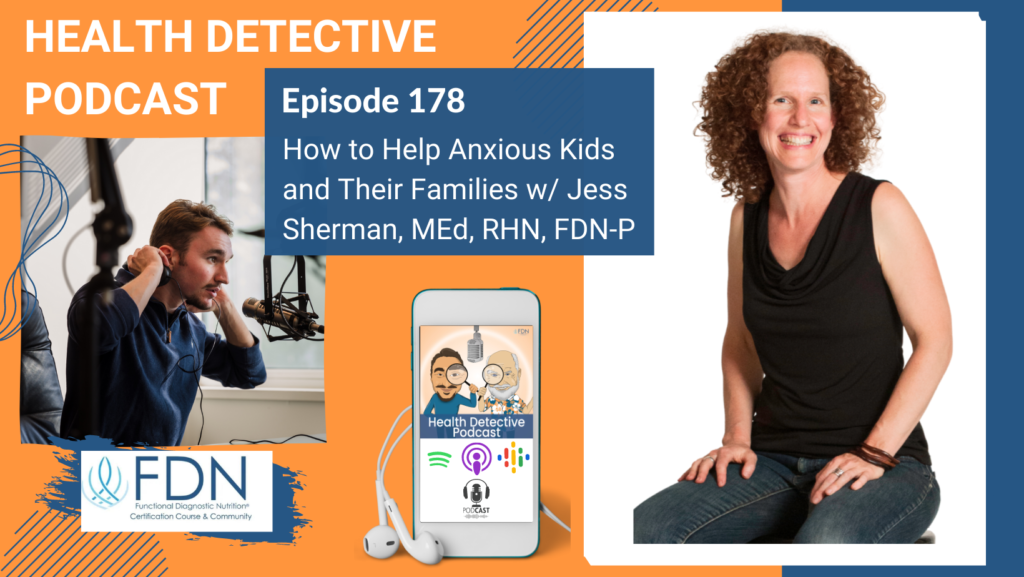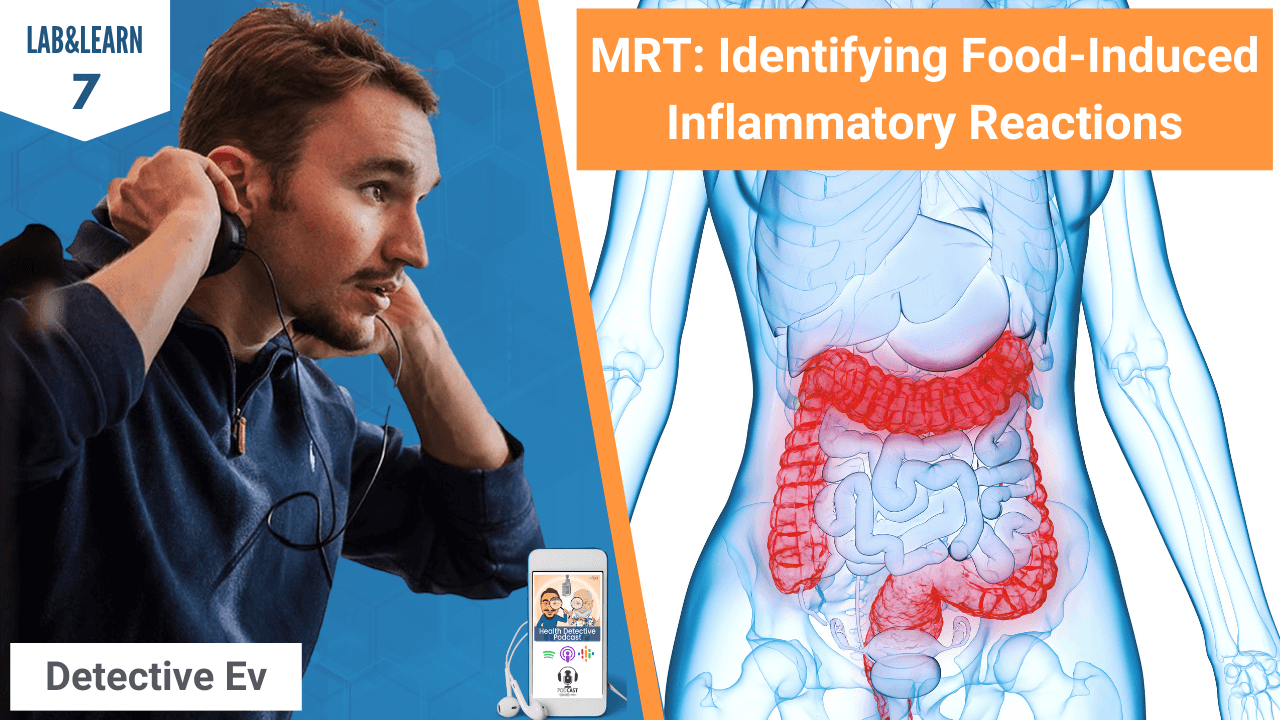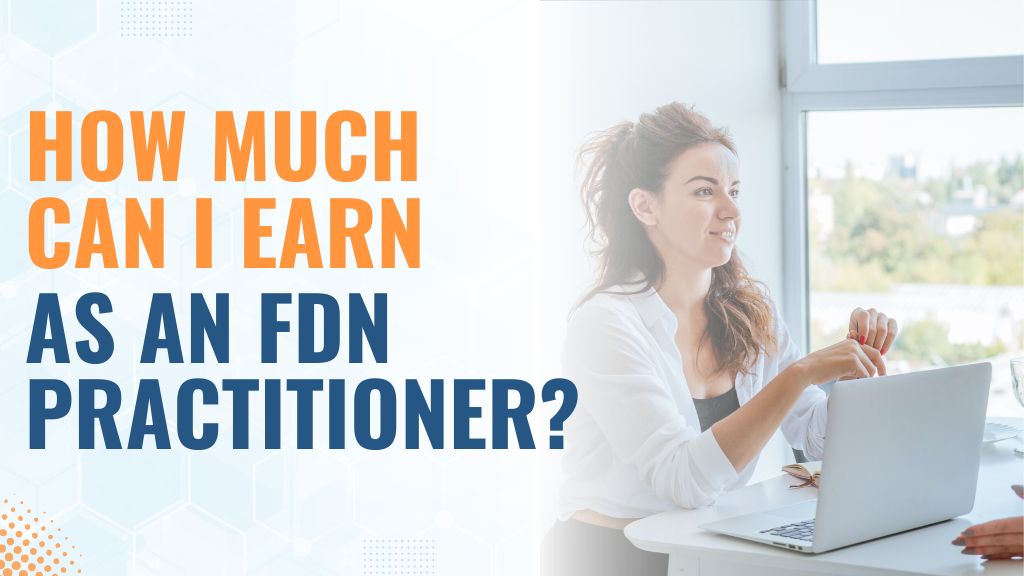Introduction
[00:00:00] Detective Ev: Well, hello, my friends. Welcome back to another episode of the Health Detective Podcast by Functional Diagnostic Nutrition. My name is Evan Transue, AKA Detective Ev. I will be your host for today’s show about anxious kids.

We’re talking to my colleague and fellow FDN practitioner, Jess Sherman. She works primarily with parents to help kids who have anxiety and other mental health things. She’s been doing this for a while. She had started in 2007, I believe it was, became an FDN only a few years back. She was working as a nutritionist since 2007 and a holistic nutritionist at that. I’ll actually give her bio first and I’ll kind of comment on it because her bio does include a lot of what we will discuss today.
She helps kids experiencing anxiety feel better so life can settle down. Along with being a certified teacher, Jess is a Functional Diagnostic Nutrition practitioner, board certified in practical holistic nutrition. With anxiety in kids now at an all-time high, she’s working to help doctors, therapists, teachers, kids, and parents understand and apply a whole-child, whole-body, trauma-informed nutrition and lifestyle focused approach to helping them from the outside in and the inside out.
Her book, Raising Resilience, take the stress out of feeding your family and love your life, along with her Calm & Clear Kids Program and her Resilience Roadmap have reached families all over the world. I thought this was extremely timely. I mean, honestly there would really not be a bad time for an episode like this.
Seeing the Need to Work with Anxious Kids
But I think what’s happening now is kind of interesting because over the last two years and change since the whole world shifted and we had this pandemic go on, I think in the beginning it was more obvious as to why kids were anxious, depressed, and all this stuff. It’s not that we wrote it off, quite the opposite. But since there was so much understanding with it, it was kind of just like, all right, let’s all go through this together.
Whereas now when I’m back in the schools and stuff, I mean, it’s normal enough in the schools. I don’t know where you live, but in the United States, most places that I go, it’s pretty calmed down. Yet we’re still seeing the aftermath, the effects of what we did to these kids.
They’re nervous, they are anxious, they have behavioral issues. They are not really at the level of maturity that you would expect socially. I always make kind of a joke that’s not supposed to be funny, that an eighth grader kind of acts like a sixth or seventh grader a lot of the times, and you can apply that to pretty much any grade.
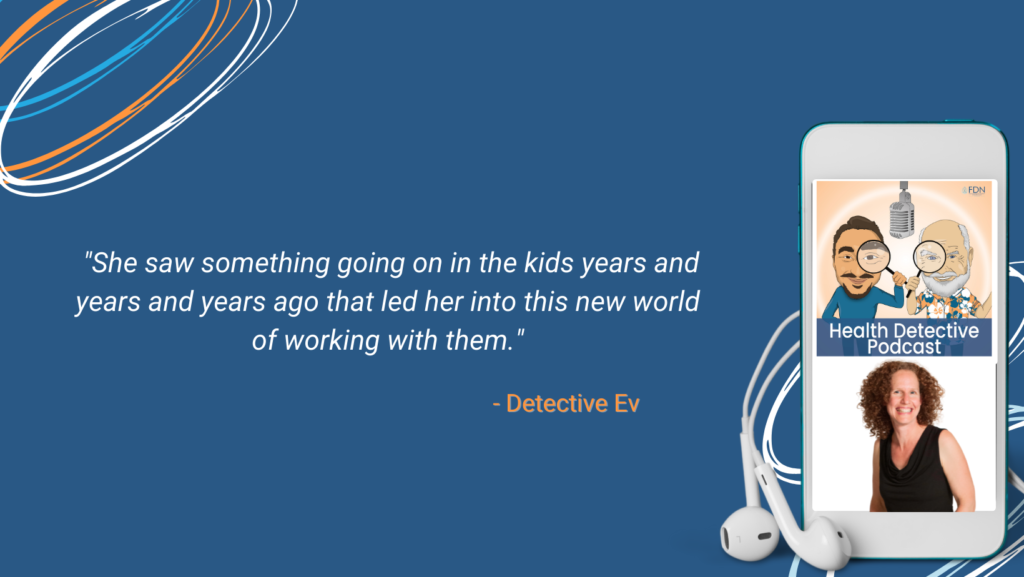
Jess is going to talk to us today about what she saw, because she actually doesn’t have a personal health story. That’s very rare on this show. She saw something going on in the kids years and years and years ago that led her into this new world of working with them.
Anxious Kids: Most Everyone Knows One
I’m just so thankful that there are people out there that are able to access Jess. I’m looking back at my own life and thinking, in 2007, how different my life was and how different things were for me. Then what it would’ve been like to have someone like Jess help our family out.
I think you guys will really like this episode. Without further ado, let’s get to it.
All right. Hello there, Jess. Thanks so much for being here with us today.
[00:02:57] Jess Sherman: Thanks so much. This is exciting.
[00:02:59] Detective Ev: I normally have my headphones on. It doesn’t really matter on Riverside, thankfully, cause they have the echo cancellation, but I feel like naked on this podcast right now cause normally I have those big podcaster headphones.
I’m glad to be here with you though. I appreciate you coming on because it’s a long story for anyone that’s listening, but really short notice. I appreciate you hopping on to someone that’s like new, fresh. We’ve never talked to you before.
Jess is in fact, an FDNP, a Functional Diagnostic Nutrition practitioner. Not only are we going to dive into her story a little bit today, we’re actually going to talk about anxiety in kids. I know that if you’re a regular listener, you understand the first time I bring someone on, it’s typically just about their story.

I think this topic is so important. I love that you brought it up. I’m in that space, myself, both in the functional space and just mental health space when it’s not related to functional medicine. There’s no way that the people listening right now do not know someone, if not relevant in their own life, that needs this message. Let’s get started with the story.
Working with a Whole Spectrum of Anxious Kids
I’d like to know how did Jess even get into this? What were your first health symptoms? Because I know that in your bio, it says you were a teacher. I’m guessing that came before the FDN. Am I correct?
[00:04:03] Jess Sherman: Yep. That’s how I got here. It’s maybe a little bit of a different story from other folks who have been on here because it really wasn’t about my own health crash at all. It was about what I was seeing going on around me.
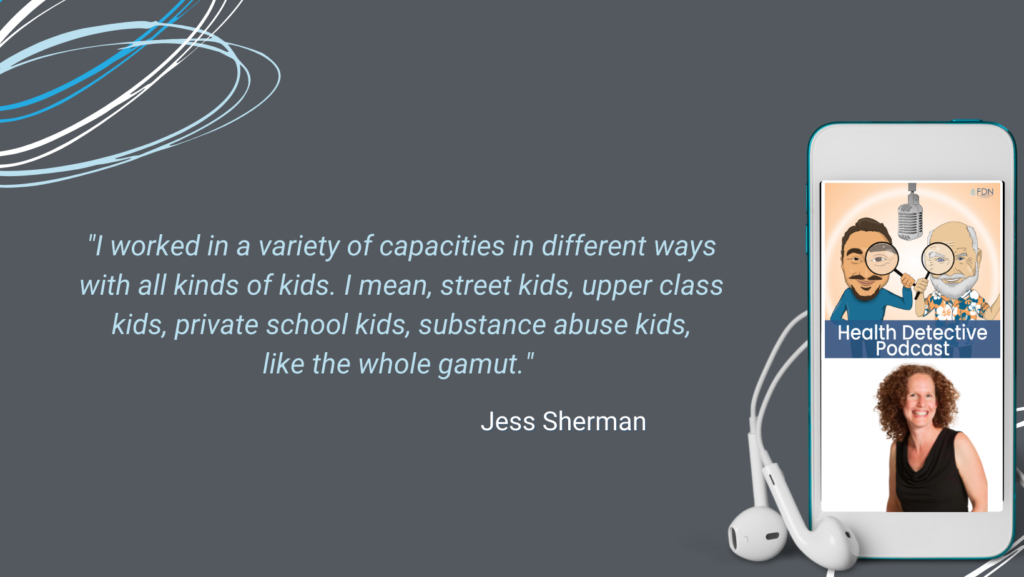
Yeah, I was a teacher for a lot of years. I’ve always wanted to work with kids. I’ve always been super interested in like what makes a person tick? What helps a kid grow into their best self? I worked in a variety of capacities in different ways with all kinds of kids. I mean, street kids, upper class kids, private school kids, substance abuse kids, like the whole gamut.
Then that eventually brought me into the classroom where I taught high school for a number of years. It was when I was teaching high school. First of all, I became exhausted. Kudos out there to anyone who is a teacher right now. It is an exhausting job. It is full of passion. At the same time, it’s a difficult environment to live in and to work in.
I was teaching school for a long time and there was this one moment I actually had my first baby and then went back to school in more of an administrative capacity. I was working at a private school at the time, so we had a headmaster, not a principal.
Learning About Toxins & Gut Health to Help Anxious Kids
I was talking to him in his office, and he dropped this casual comment that about 60% of the kids in our school were on some kind of medication. We knew that because it was a boarding school. We had a school nurse, and she was doling out the meds.
I was like, whoa, whoa, whoa. I was like, what? How is that possible that more kids than not needed something? You know, sometimes it was as simple as a laxative cause they couldn’t poo. Or sometimes it was a psyched because they had aggressive tendencies or something like that. So, it ran the gamut.
But more kids than not needed a medication to get through their day. I was stunned by this. I’d always been really interested in health and nutrition and just lifestyle stuff.

I decided like to take a sabbatical cause I was kind of exhausted. I had a new baby, and it was the right time to take a sabbatical. I decided to go back to school to study nutrition. I became a holistic nutritionist, registered holistic nutritionist. That’s when I learned about toxins, gut health, all of the forces that impact how we feel, not only in our bodies, but how we feel in our minds.
I didn’t know any of this as a teacher. I was like, if I had known this as a teacher, that there was like all this stuff going on, this chaos, like what FDN calls, metabolic chaos going on in their bodies, I would think differently about their anxiety, and their ADHD. Literally, I would have kids like throwing themselves against the wall and throwing themselves against the chairs because what I understand now is they needed that pressure.
The Goal to Help Depressed, Suicidal, and Anxious Kids
Anyway, I started understanding kids very differently when I started to understand the insides of them. Then I got really interested in how can we dig further and look in the windows through these functional lab tests. That took me to FDN. That’s my story.
[00:06:47] Detective Ev: Well, this is unique. For those that don’t know, Jess and I have not particularly crossed paths in our careers as FDNs. I’ve seen your name, but this is kind of cool to get to dissect this because that is unique.
Almost universally, I can actually count like two other people who have gotten on this show that didn’t have these very personal health stories of extreme stuff. I actually admire that greatly that you saw pain in someone else’s life and were willing to figure this out for them. That’s kind of cool because you’re fighting for these people that don’t even know you’re fighting for them. That’s kind of an amazing thing to go and choose to do with one’s life.
I see it as well. I don’t know if you know this about me, I speak in schools. That’s my job outside of FDN. I go do these motivational talks for mental health. I don’t necessarily talk about the functional side.
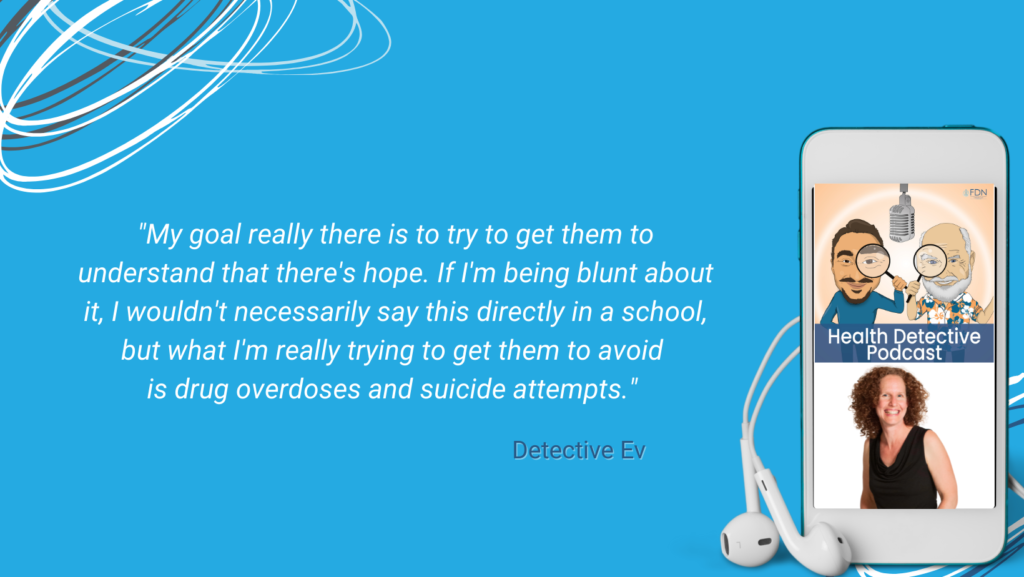
My goal really there is to try to get them to understand that there’s hope. If I’m being blunt about it, I wouldn’t necessarily say this directly in a school, but what I’m really trying to get them to avoid is drug overdoses and suicide attempts. Right? I want the most extreme cases of this to be avoided. How we heal is going to be pretty unique to everyone.
Connecting Eating & Sleeping Habits with Anxious Kids
I mean, there’s people who have been severely abused and might not have ever gotten that trauma resolved. Of course, we both know they’d be better off with a good nutrition plan. But at the same time, if they don’t ever get that addressed properly, all the nutrition in the world is only going to ever do so much. It’s a very complicated topic.
But when 60% of kids in a school are on a medication, it does not take a health professional to use their head and realize something about that doesn’t add up. What I’m curious about is how did you initially make the connection. Why did you go do nutrition?
I mean this seriously; some people have very limited views about what might be causing health issues. Maybe they think it’s kids on social media. Maybe they think it’s kids not exercising. How did you come to the conclusion that I should go study nutrition?
[00:08:30] Jess Sherman: That’s a really good question.
I’ve reflected on this quite a bit. It’s interesting to me that I didn’t go into special education, right? I didn’t want more educational tools. I didn’t want more things to talk about. I wanted to understand their bodies.

I don’t know what it was intuitively. I mean, I’d always been really interested in food, and I saw how these kids were eating and I saw how they were sleeping. I had a particular vantage point because it was a boarding school.
I guess there was just something in there, I was like, this is all connected somehow. I didn’t quite understand how, but, yeah, it’s interesting to me that I went the nutrition route. I’m glad that I did, but it was a hunch, I think. It was a hunch.
Follow Your Intuition: The Natural Route for Anxious Kids
[00:09:06] Detective Ev: Well, this is where your story is not so dissimilar. I kind of asked for that reason, and I didn’t know if it was going to be that answer, but I’m glad it was.
One of the things that I’ve noticed Jess is when I ask people on this show (now they’re dealing with their own personal health issues), I ask them how they ended up going kind of against Western medicine. Because for the average person, it’s so hard to comprehend how tough of a decision this actually is if someone hasn’t been through it like yourself in your own way or another guest on this show.
You are being told by people who are put on top as like the smartest, some of the most educated, highest income earning people that you could possibly be in society – doctors. You have to go against them as probably a lay person and that goes against everything we’ve ever been taught since day one. That doesn’t really make sense to do that. I’m really impressed when people can do that.
But when I ask them, what made you go to a more natural approach? The number one answer by far, 90% plus on this podcast in 180 something episodes is I just felt that it made sense. I had a gut feeling. My intuition told me. And I think there’s something to be said about that, especially in this space, it seems to happen all the time.
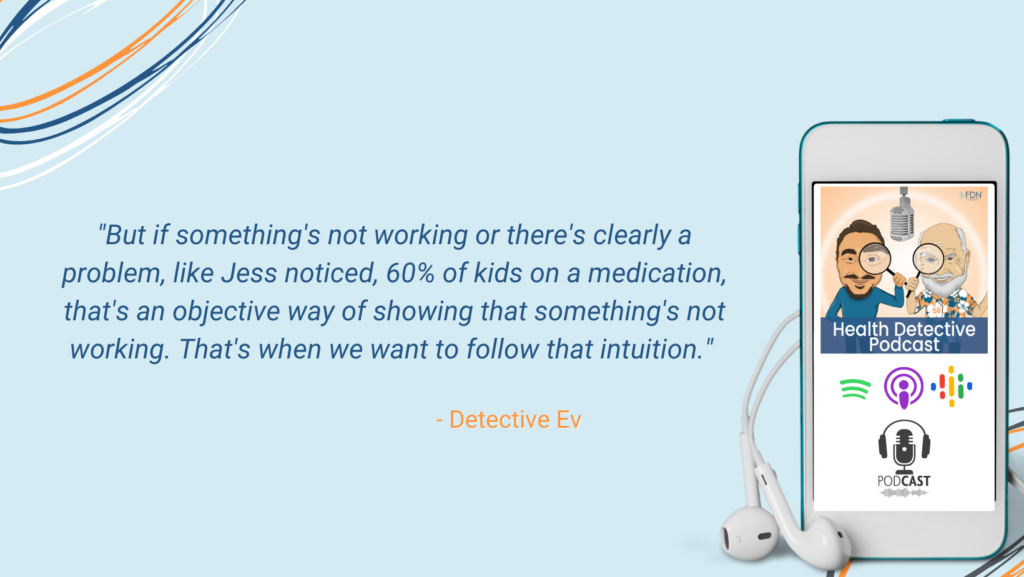
I’m not saying don’t listen to your doctors, that’s insane. But if something’s not working or there’s clearly a problem, like Jess noticed, 60% of kids on a medication, that’s an objective way of showing that something’s not working. That’s when we want to follow that intuition.
Providing Educated Options for Anxious Kids and Their Parents
If something’s not working, it must be something else. Where do I go? It’s learning to listen to that inner voice. That took me a while, but now that’s something that kind of guides me within my own life.
[00:10:37] Jess Sherman: As a teacher, we were really frustrated, and we would talk about this in our meetings. I should put the caveat out there that we had a particularly difficult cohort of kids.
The kids that came to our school, they needed something else. So, it was maybe a little bit skewed in terms of demographics and statistics. But we spent a ton of time talking about how do we help these kids feel better, connect, and a lot of emphasis on relationships.
As a teacher, it was really frustrating because when all of our tools weren’t working, our only recourse was medication, to send them into the medical system, either to psychoanalysis or medication or what have you. I felt really frustrated by that because I was like, ah, I think there’s something else happening.
Parents were really frustrated by that too, because every parent that I speak to, they don’t want to put their kid on meds. They will if they have to. They want to do the right thing for their kid, but they all want to know their options.

That’s what’s really driving me is to help parents, teachers, therapists, doctors, anybody who’s interested in the wellbeing of kids, kids themselves, understand what their options are, all the various options that they have so that they can make an educated choice. They can choose something that fits with what they feel is best.
Leveling the Playing Field for Anxious Kids
[00:11:49] Detective Ev: The health show that I was doing before I started doing this for FDN, the tagline was “leveling the playing field around physical and mental health”. I think what you just described should be the mission of all of us.
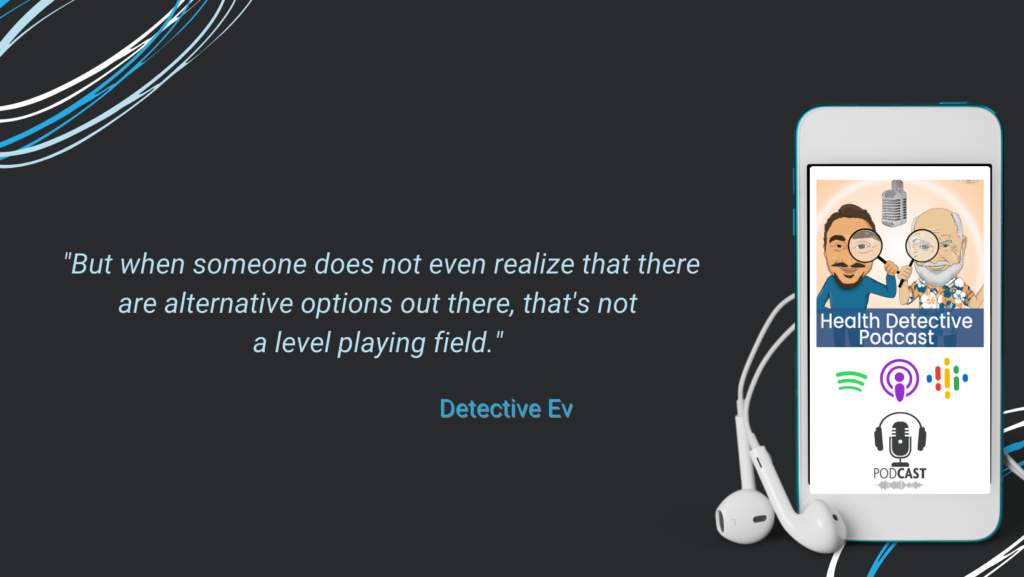
It’s not being against medication. It’s not being against counselors or anything like that. We just acknowledged already there’s a unique time and place for any of those things, if not a combination of them. But when someone does not even realize that there are alternative options out there, that’s not a level playing field.
I had a good friend that passed away from a drug overdose. He dealt with abuse, some really extreme stuff as a child. If I told him to do what I do, which is, you know, catch sunrise every day, I wear my blue-light glasses. I eat paleo and stuff like that. That’s almost insulting for someone who’s dealt with that.
But similarly, for someone like me who had a pretty decent life to just say, you’re deficient in Zoloft, that’s equally as insulting. We might need a life jacket, initially. Reed Davis talks about that in the course, that is okay. We gotta keep people afloat.
But the fact of the matter is this, Jess, I was offered the Zoloft, I was offered the Xanax, and there was nothing else. It was here’s this life jacket. That’s great. But we’re never going to help pull you outta the water in any other way or tell you anything about this.
It’s usually because these people don’t know, I’m not suggesting that they’re hiding something, but they don’t know it themselves.
Anxious Kids and the Gut-Brain Connection
Most doctors don’t look like they’re sitting on the fountain of youth in their back office. They look just as sick as the rest of us.
When you were learning about this nutrition stuff, initially, you said you learned about gut health and all these different things. Was there anything in particular that was shocking? Did you just, I never even considered this before? Cause I know for me, when I first heard about the gut-brain connection, that was a revolutionary concept to myself at the time.
So, I’m just curious if there was any shocking things that were “ahas” for you, connecting the dots for why 60% of these kids might have been on meds.
[00:13:30] Jess Sherman: Intuitively, I kind of knew, I think there’s something up with the processed foods. That wasn’t a shocker to me that processed foods are bringing literally messages of danger into our bodies and keeping our nervous system all revved up.
The gut-brain connection, I kind of knew a little bit about it, but the extent to which the highway of messages that are going from the gut to the brain, some from the brain to the gut, also. I always have to put that in there that 20% of the messages are going from the brain to the gut, but 80% going from the gut to the brain.

That really helped me because it helped me understand that it’s a bidirectional thing. Helped me understand that these kids are really stuck in a vicious cycle. How you think affects your gut and what’s going on in your gut affects how you think. That was a big one.
I think the biggest one though, was the impact of chemicals and toxicity. That one was massive.
Taking the Big Picture into Account to Help Anxious Kids
The profound effect of this toxic soup that we’re trying to raise our kids in and how it’s impacting our mitochondria, it’s a vicious cycle. The higher your toxic load, the more impaired your detox capacity becomes. So, you get stuck in this vicious cycle.
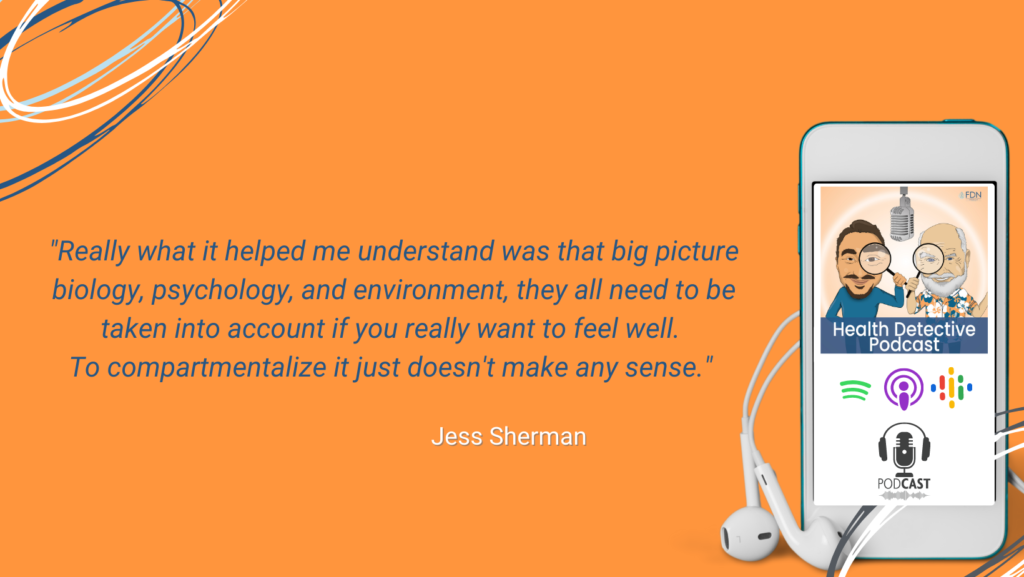
I think those were two biggies. Really what it helped me understand was that big picture biology, psychology, and environment, they all need to be taken into account if you really want to feel well. To compartmentalize it just doesn’t make any sense.
[00:14:53] Detective Ev: We’ll talk more, a little bit, about the specifics and the toxicity in a bit. I just wanted to know the answer to that question, first.
One thing I want to rewind to cause it’s always an interesting part to me and I think the audience as well, is we talked about the summarized version of how you ended up getting to FDN, but I’m curious about more maybe specifics. When you said you studied nutrition, I’m guessing that was a formal, maybe college thing. How long did it take to get to FDN and what was the appeal to you about this? What resonated with you when you were reading about the course or maybe watching videos?
[00:15:21] Jess Sherman: Well, I started because I was a new mom. I started with nutrition because all of a sudden, I was like, holy cow, I have to keep this kid healthy. I was seeing (I was a teacher also), so I was seeing what was happening to kids. I was like, kids are disintegrating. Now I have this little baby and I gotta do the right thing. How do I do this? I was looking around and I was like, someone guide me.
Using Labs: Looking from Many Perspectives to Help Anxious Kids
That took me to nutrition school, which was a college level thing. That’s when I started to see this whole other perspective for how I could help moms navigate this tricky business of feeding their own families, but then also how we can help kids by bringing this perspective to everybody who’s trying to help them.
That was in 2007. I did that work for, I don’t know, I did it for at least 10 years of just like helping parents understand how to feed their kids, just this purely nutrition. When I was feeding babies, I was teaching about feeding babies. When I was feeding toddlers, I was feed teaching about feeding toddlers.
There was a lot of allergy stuff in there, food sensitivity stuff in there, a lot of elimination, diet type of things. I would work alongside naturopathic doctors often to do the food piece when they were doing the strategy stuff.
Then I’m not sure how I found FDN. I think it was on my radar for quite a while because I was aware of all of the tests because I was working with naturopathic doctors who were doing them. I understood them.
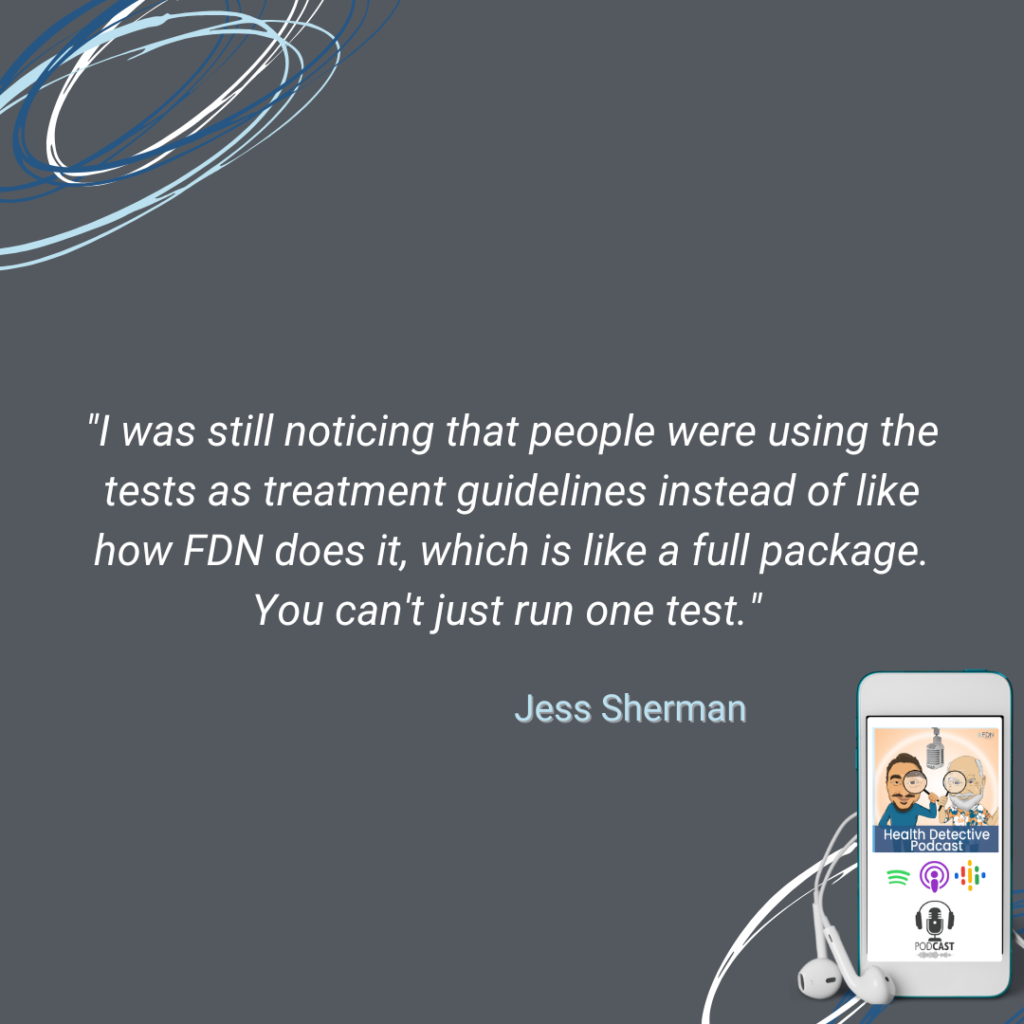
Then I was like, I want to go deeper into this. I was still noticing that people were using the tests as treatment guidelines instead of like how FDN does it, which is like a full package. You can’t just run one test. You talk about this all the time, it’s like your tests are windows into the body.
FDN Helps Parents with Anxious Kids
If you look from one perspective, you’ll see one story of what’s going on in there. Then you need a couple of other perspectives to get a full picture of what’s going on in there. That can really guide your decisions.
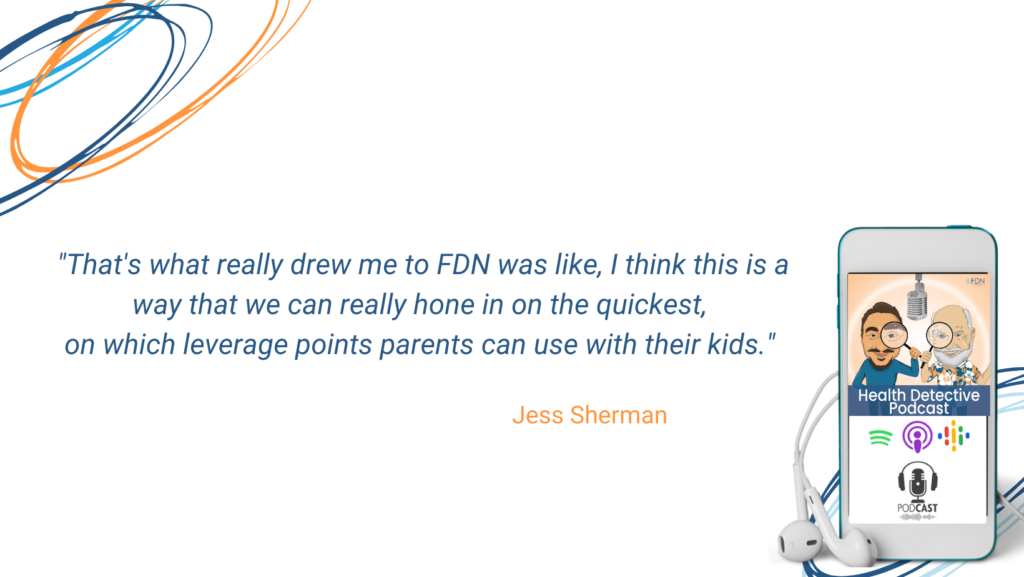
For parents who are exhausted, maxed out, and stressed out already dealing with their own hormone issues and all that, we really need to make their plans efficient and dial them into where they’re going to get big bang for their buck in terms of their energy, well, all their resources. That’s what really drew me to FDN was like, I think this is a way that we can really hone in on the quickest, on which leverage points parents can use with their kids.
[00:17:36] Detective Ev: So, you’re a veteran, you’ve been doing this for a while. Again, I want to go back to what I said in the beginning. I think as someone who dealt with this as a kid, I was super anxious, panic attacks, substance abuse. I was struggling. I didn’t end up leaving school until 2013. I didn’t even graduate high school because of this.
To know that in 2007, there’s already people out there like you, that were recognizing these things and actually doing something about it, I just commend you for that. I’m thinking about it now and I feel like this would be a better received message.
People kind of get it now or whatever. That last 15 years, no, there’s a significant social change in how people would’ve looked at something like that, or your willingness to leave teaching and then go do that, that’s pretty impressive.
Community Support for Parents with Anxious Kids
Before we even talk about the specific things maybe that get recommended to these families, what I think everyone is going to be wondering that’s listening cause I know that we have a predominantly female audience, not exclusive, but predominantly female, if they’re moms or soon to be moms, one of the first things they’re going to wonder is how on earth are you navigating this modern world where the kid goes to school and gets the craziest foods in the world, or they go over their friend’s house and they see what their friends are eating.
I feel like with your experience, you’ve probably learned a thing or two about these habit changes that are necessary for the families. Without even talking about the “what” they have to eat or not eat, how do you get a family on board with this and get them to get the kids on board when the entire world is against us for this?
[00:18:57] Jess Sherman: That is a challenge, Evan. I’m not going to pussy foot around it; it is a challenge. One way that I do it is about, I guess it was 2015 or so, I stopped clinical work, where I was working in a brick-and-mortar office, and I went online. By going online, I can now talk to parents all over the world and I can bring them together in groups.
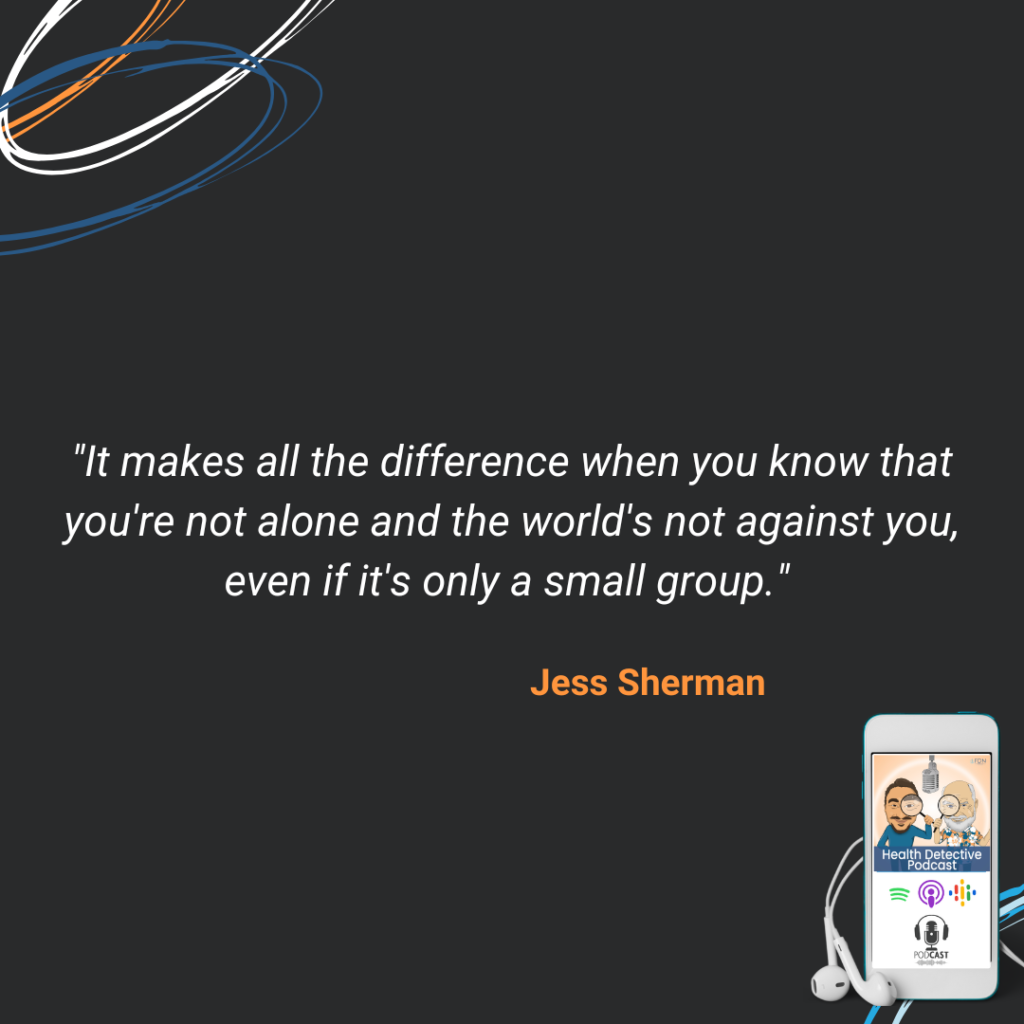
It makes all the difference when you know that you’re not alone and the world’s not against you, even if it’s only a small group. I’ve got a group of people; we do office hours every week in a zoom room. We get together and we talk about implementation struggles, and we talk about what do you do?
Finding a Starting Point for Families with Anxious Kids
What do you do when this happens? What do you do when that happens? Whoever wants to come can come. Sometimes it’s five people, sometimes it’s 10 people. It depends on who’s available. But just to know that there are a couple of people out there who understand what you’re going through, makes all the difference to your own resolve that this is important.
I split it up for the families that I work with to say, we’re going to do an investigative piece. We’re going to learn a lot about your child’s body, that I can promise you. At the end of the time, we are going to know what is going on in their body, through the FDN labs and all that.
Then there’s the implementation piece, which I can make no guarantees about because I don’t know their kids, I don’t know their family. We will absolutely help them. We know we will help them, and we will motivate them. We do implementation challenges, and we get them focused on things.
But sometimes parents tell me, I know this piece is important, but I can’t implement it right now. And I’m like, okay, you can’t do that right now, we’re going to come back to it. We’re going to put it on the shelf, we’re not going to drop it cause this is an important piece of your child’s physiology. We’re going to come back to it and we’re going to start somewhere else.
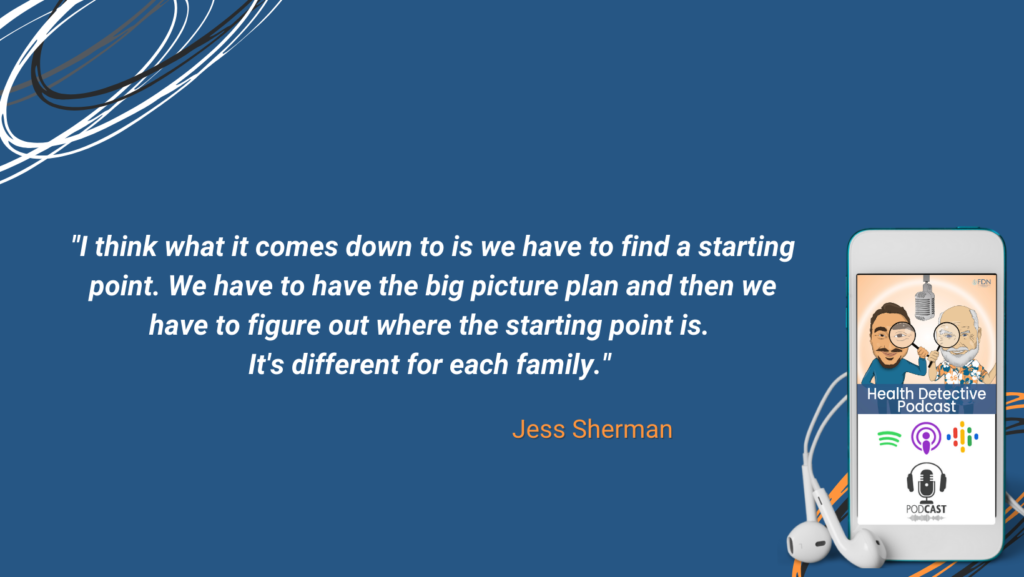
I think what it comes down to is we have to find a starting point. We have to have the big picture plan and then we have to figure out where the starting point is. It’s different for each family.
Commercial Break – Try the FDN Course for Free
[00:20:44] Detective Ev: It is indeed different for each family and each client. That is why we need to use functional lab testing to figure it out.
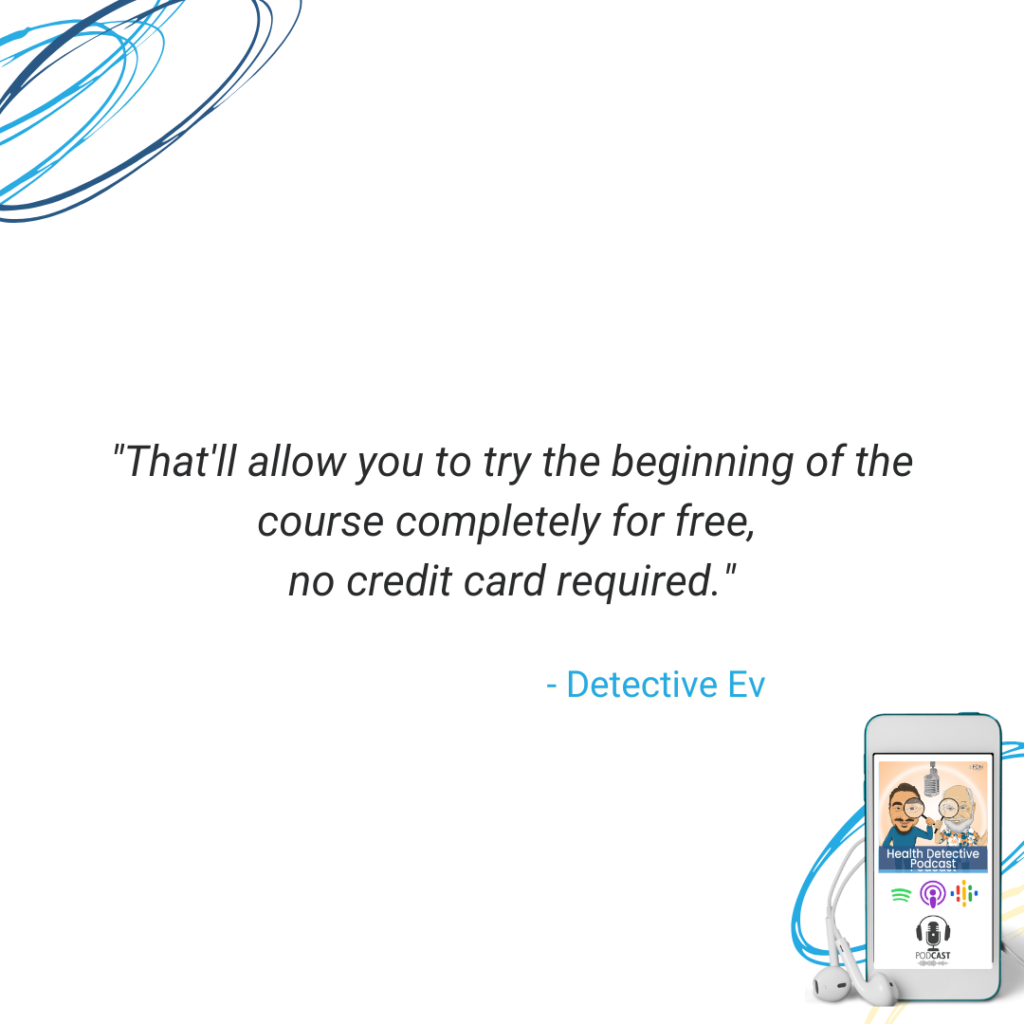
If you’ve been considering the FDN training course, like myself and Jess went through and had success with, then go to fdntraining.com/tryfdn. That’ll allow you to try the beginning of the course completely for free, no credit card required.
That’s fdntraining.com/tryfdn.
All right. Now, back to today’s episode.
You’re the Sum of the Five People You Hang with Most
Fair enough. I like that group aspect, cause FDN obviously does this on a large scale, but I think that’s what FDN provides to so many people. If I go out and just walk through the grocery store today, I would feel very isolated in what I do.
Yet, thankfully, I’m lucky enough to live in this bubble where I go on my Facebook or Instagram and because I’m so connected with all of you guys, I feel like all I see is cool health stuff or posts about this or that, or the next thing. Yet, that’s just not everyone’s reality. In fact, it’s not the majority’s reality.
So, that group dynamic and just knowing that other parents are going through it, and maybe tips and tricks that they learn, yeah, that’s very valuable.
[00:21:41] Jess Sherman: I was just going to say, like in the business world, how we talk about, you are the sum of the five people you hang out most with. They rub off on you. I have found to be true.
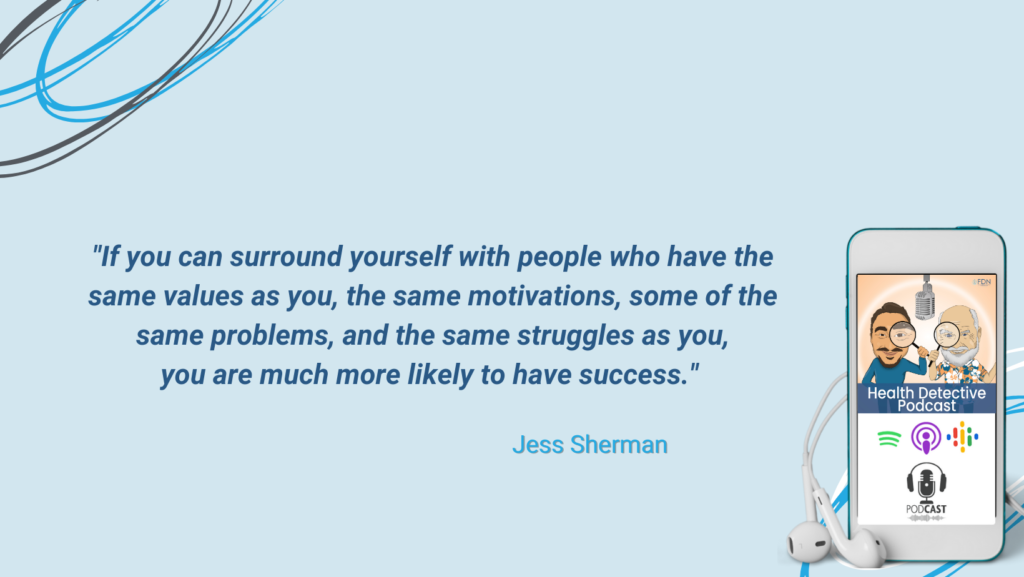
It’s the same thing with health and wellness. If you can surround yourself with people who have the same values as you, the same motivations, some of the same problems, and the same struggles as you, you are much more likely to have success.
[00:22:04] Detective Ev: Absolutely. I love that you brought that up. That’s one of my favorite, not a quote per se, but like a principle of that. It’s something you have to constantly remind yourself with. If I’m stagnant in one or more areas of my life, I need personal responsibility for that, of course. But I also look at like, what are the five people around me doing?
People are Accepting the Natural Health Route
Shockingly, they’re all doing the same thing, or they’re stuck in the same spot. So, you gotta change the environment and then watch yourself change. We’re slowly pushing that. We have our little core group of health freaks in the functional space, and we’ll slowly infect the rest of them with this good message of health.
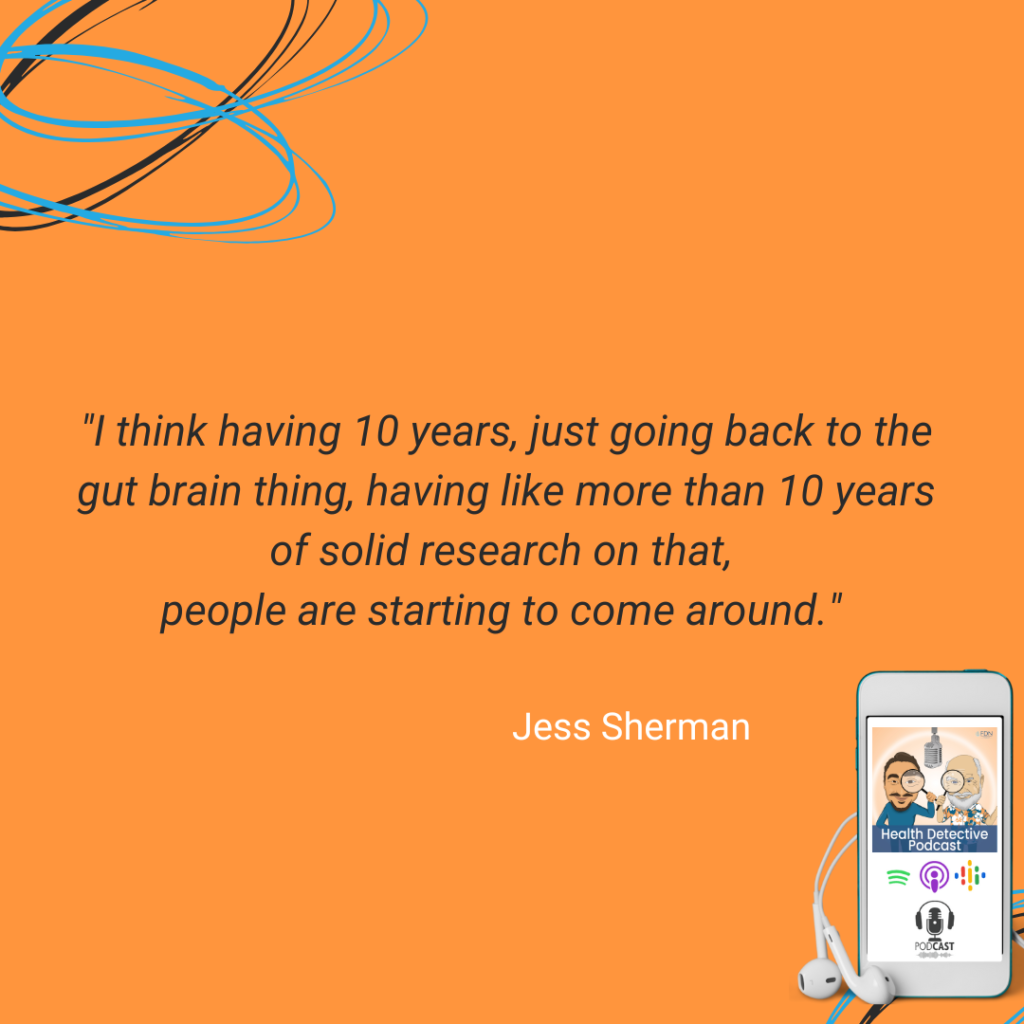
[00:22:33] Jess Sherman: I wanted to say that the tides are changing, they really are. People are more interested. I think having 10 years, just going back to the gut brain thing, having like more than 10 years of solid research on that, people are starting to come around. I’m starting to get even some doctors, they’re being like, maybe you should go talk to Jess.
I’m starting to get teachers interested, how can I talk to the parents about this stuff without stepping on people’s toes? I still feel like people want to do right by kids. They want kids to thrive. They want kids to do well. They want information and ears are open.
[00:23:06] Detective Ev: Absolutely. What are some of the most common things, or just themes that you’re seeing on the lab testing that you’re utilizing? I know that we talked about toxicity. I also understand that everyone’s individualized, but I have found that this question has merit. When someone serves 40-year-old women that are dealing with certain conditions, I found that there’s patterns there, or maybe hyper athletic males, there’s patterns there.
Is there something that’s coming up a lot for these kids, with the tests that you’re utilizing?
H.I.D.D.E.N. Stress Patterns for Anxious Kids
[00:23:32] Jess Sherman: Yeah. There’s five main things that are coming up all the time. I kind of boiled it down to that. There’s nutrient imbalances, there’s food reactions, there’s toxicity, which we’ve talked about. Usually the toxicity stuff is paired with compromised detox pathways. Usually there’s a genetic piece going on there. There’s gut imbalances, we’ve already talked about. In some cases there’s infections, whether those are infections in the gut or those are things like strep and staph and things like that that are putting pressure.
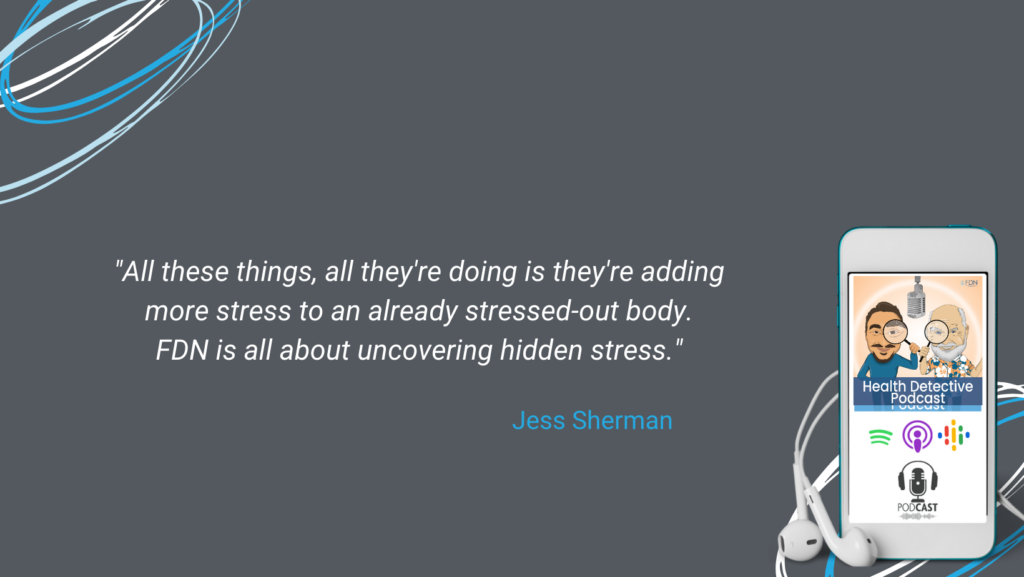
All these things, all they’re doing is they’re adding more stress to an already stressed-out body. FDN is all about uncovering hidden stress. I wrote a book called Raising Resilience back in 2016, this was way before I discovered FDN. That was my goal with that book was to help parents go beneath diagnosis and understand their kids through the lens of stress.
What FDN helped me understand more specifically was how stress impacts the body and what I’m most interested in is, how it affects the nervous system. I kind of took the H.I.D.D.E.N. stress acronym that FDN uses and translated it into what I see specifically for anxiety and mood and learning issues in kids.
Those are the things I’m seeing repeatedly, particularly the gut ones. Nutrient imbalances, those are big. I’m seeing a lot of copper toxicity. I’m seeing a lot of zinc deficiency. I’m seeing a lot of mineral imbalances. It becomes so evident when you see it on paper, and a ton of food reactions and gut problems.
Objective Test Results Motivate Implementation
[00:25:03] Detective Ev: I think this is where the labs are very applicable because people need to see these objective things sometimes to get motivated.
I would imagine as a parent, I’m not one, but if I’m seeing my kids’ lab results and I can see these things are really messed up and I know I’m having these behavioral issues or whatever it might be, physical health issues too, then, yeah, I think that’s very motivating.
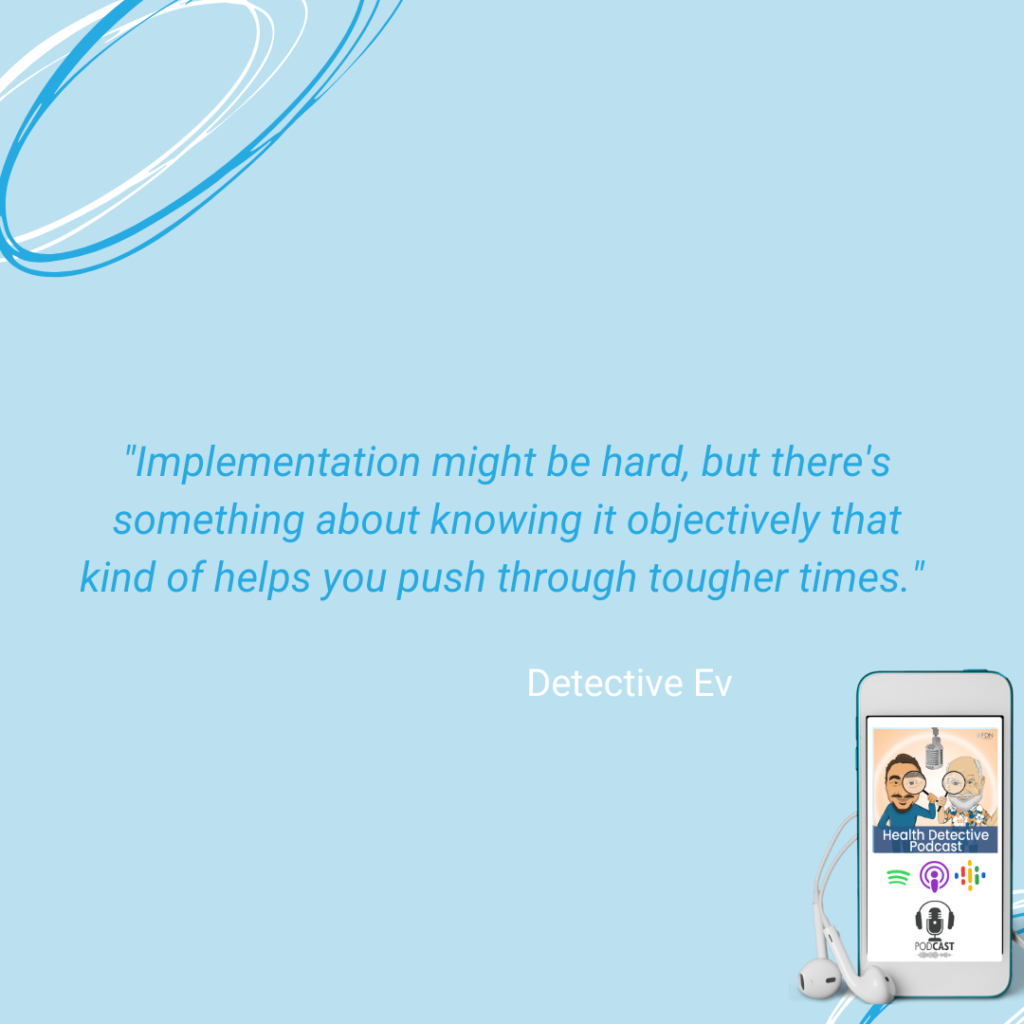
I love the lab tests for that reason. Implementation might be hard, but there’s something about knowing it objectively that kind of helps you push through tougher times. Maybe you fall off the wagon, but you get on a little quicker than you would’ve had someone just recommended something loosely without any objective proof that that person actually needed that recommendation. It’s easier to fall off.
Cause you’re like, well, I don’t even know about this anyway versus, the food sensitivity is one I would say is one of the biggest motivators. When you can see that you’re reacting to a food, that’s black and white. Either you are, or you aren’t. Either it’s severe or it’s really nonexistent. It’s tough every time to go eat that food or serve your child, that food when you know that this is going to kind of tick them off a little bit.
I’m assuming that you’re working with parents that have kids in public schools as well. I know we already kind of discussed the implementation thing, but I’m trying to think about this. Is it really practical to get kids to change their behavior, even in public schools?
The Importance of Being Informed About Anxious Kids
Is that something that’s happening or is that just really something that’s a huge barrier that you have learned to navigate? I feel like that’d be one of the biggest concerns from the people listening is this idea of, I can control my kid all the time and then they go to school and then that’s it. That surpasses even the other implementation question I asked. That’s just a totally, really tough thing.
[00:26:29] Jess Sherman: It is a really tough thing. We talk about it a lot.
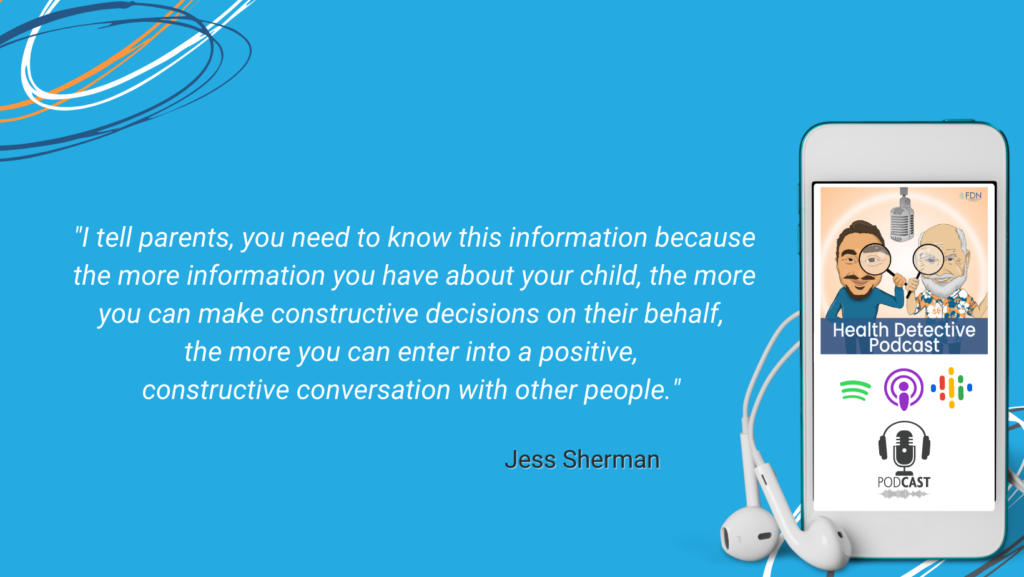
I’d say a couple of things. One is, that just because it’s hard doesn’t mean it’s not worth doing. I tell parents, you need to know this information because the more information you have about your child, the more you can make constructive decisions on their behalf, the more you can enter into a positive, constructive conversation with other people.
There was a time when talking about ADHD meds in school between a teacher and a parent was a kind of taboo thing, or like, hey, I think you should go to a psychiatrist kind of thing.
Now it’s like, you walk into any school, there’s like noise-canceling headphones, and there’s like quiet spaces. People understand about neurodiversity, and they understand about food allergies. This is just another one of those things. There is a lot of work we need to do.
I love talking to teachers about the stuff, about some of the things. Teachers are in a very awkward position when they are very health-minded and they’re seeing junk come in the lunches. How do you have that conversation with the parent without blaming the parent for whatever they’re choosing? It’s a very tricky situation.
Fighting for Improved Health-focused School Culture
On the flip side, there are some things that teachers can be aware of, bringing any kind of food into schools or having snacks or birthday celebrations, things like that. That could be a little bit more inclusive for kids. It’s changing.
It is definitely changing over the last 10 years. Like gluten sensitivity is almost as common as peanut allergy in the lexicon of teachers. It’s not taken as seriously because it’s not life threatening the way anaphylaxis is, but they’re open to conversations.
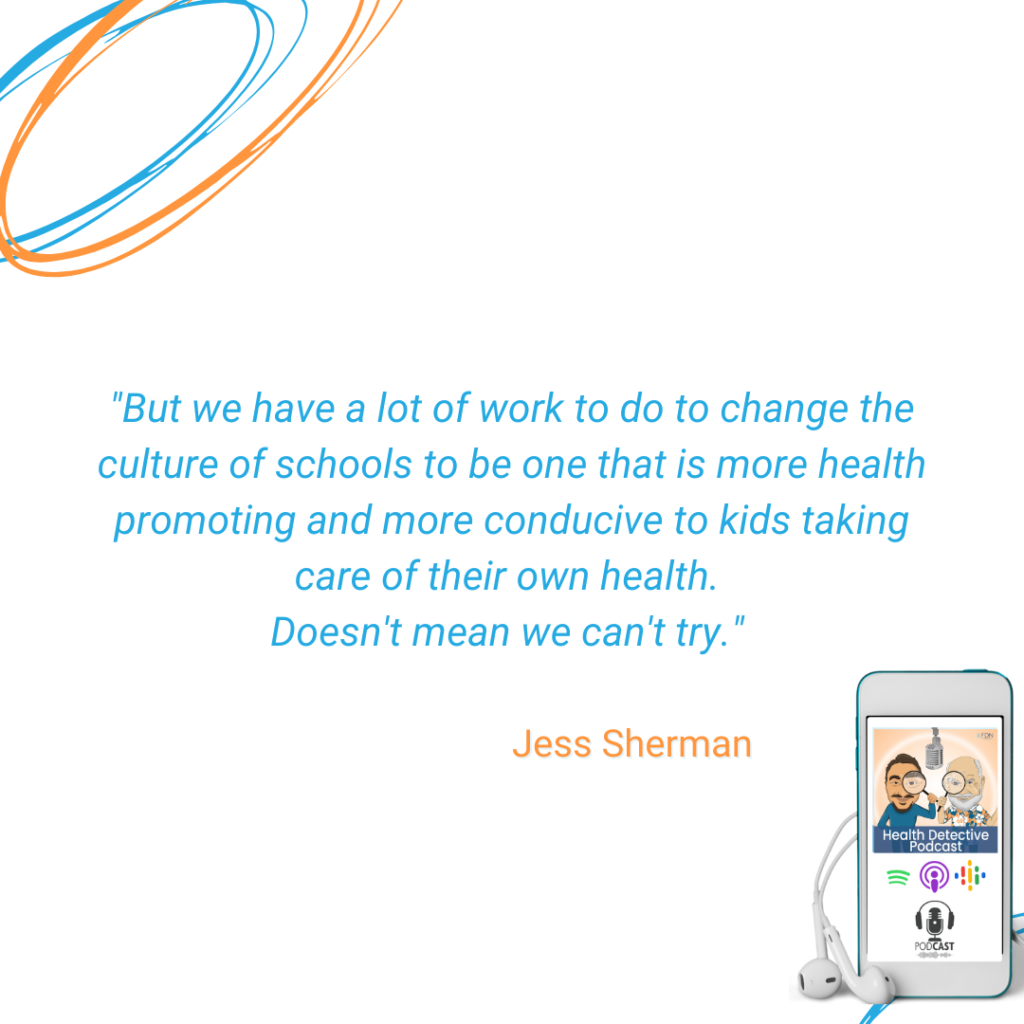
But we have a lot of work to do to change the culture of schools to be one that is more health promoting and more conducive to kids taking care of their own health. Doesn’t mean we can’t try.
[00:28:12] Detective Ev: Hey, we wouldn’t be on this podcast today if I didn’t believe in it. It’s a side story, but I have a friend, he’s absolutely brilliant. He’s very aware of a lot of the crazy things going on in the world. He just kind of gets locked up in them and starts thinking about them. We talk about that together.
I still have a pretty optimistic outlook on this world, and he asked me, how the heck are we talking about the same thing and yet you have this optimistic outlook? I asked him one day, I said, don’t gimme a hard time answer me, honestly. Do you think there is at least, bottom line, at least, a 1% chance of us figuring this stuff out? Jess, we’re talking about things from the issues with kids to environmental issues, like all this kind of stuff.
Parents of Anxious Kids Want Healthier School Environments
I said, do you think there’s a 1% chance at least? He’s like, well, yeah, there’s probably more than that. I said, cool, man, then we better get to work. Right? If it’s zero, I’m going to be miserable with you too and then we can just continue to pout all day. But if you give me a 1% chance, Evan Transue is going to run after that. Like, let’s get to work.
It’s shame that sometimes the most brilliant people get disabled by this stuff, cause I’m like, do we need your brain? One person can invent something really cool that helps fix this stuff, especially the more complicated issues in this world.
Now with this, especially since you’ve worked with teachers as someone who was teaching at one point, is there any recommendations for the schools to be able to address these issues? That’s my thing is like I go into these schools, the teachers sometimes, if I do like a parent talk, they’ll be there and they’ll get to hear about my natural stuff.
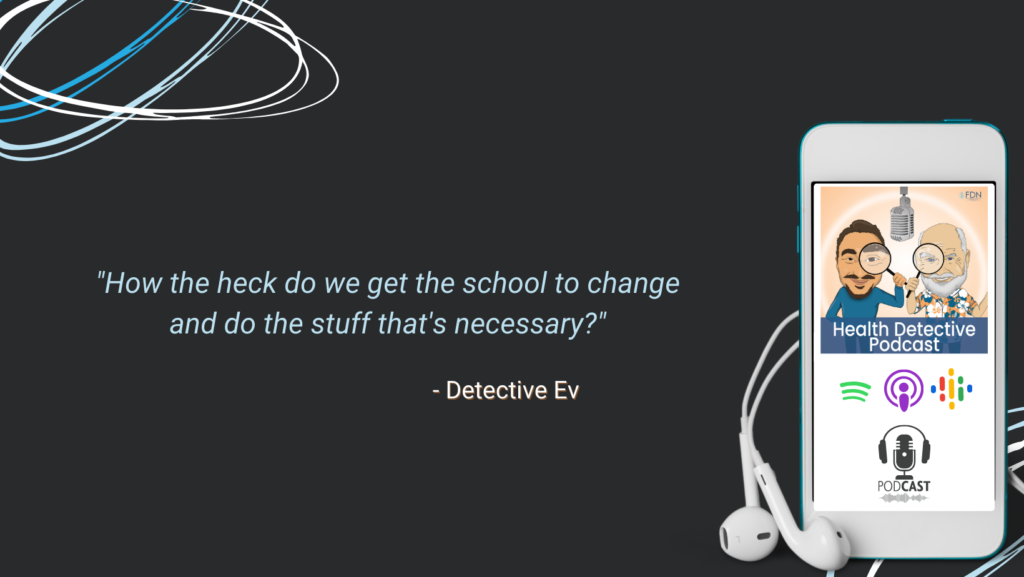
I talk more to the parents about that side. I might leave it out with the kids a little bit, but the parents I talk to, and they say, oh, this is great. This is awesome. How the heck do we get the school to change and do the stuff that’s necessary?
I don’t know whether it’s like a special food company I can recommend that maybe serve some better stuff for kids or what. But I’m curious about what recommendations you’d like to see implemented in a school or that you’ve seen work in the past.
Commercial Break: Five-star Review
Hey, my friends. It is Detective Ev popping in here really quick. If you’re listening to this episode, perhaps you’re a regular listener and you’re thinking, you know, I like the content that these guys put out. Then please consider leaving us a review on whatever app you are listening on. It can just be the five-star thing. That’s totally fine. If you want to leave a few kind words, that’s even better.
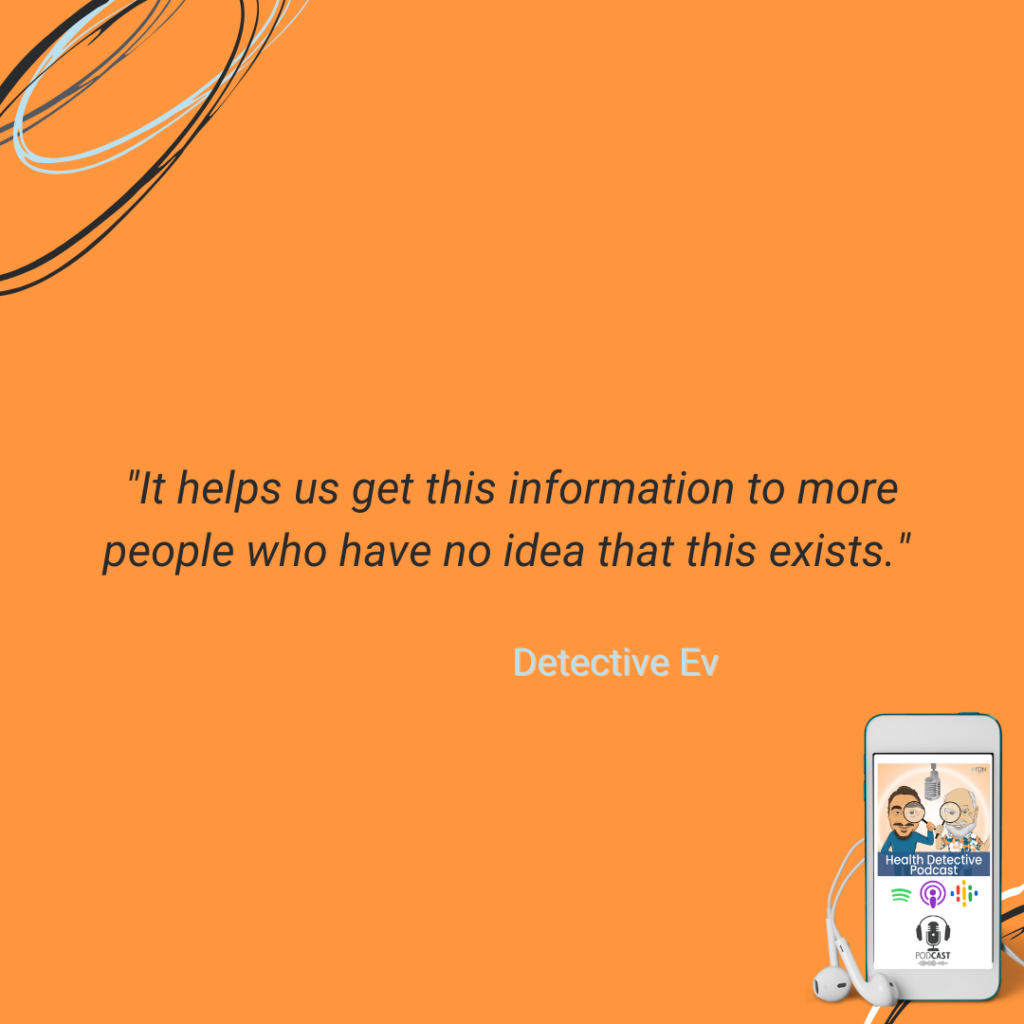
We would greatly appreciate it. It helps us get this information to more people who have no idea that this exists.
All right now, back to today’s episode.
Healthy School Food Policy vs. Healthy School Culture
[00:30:16] Jess Sherman: That is a big, big question, Evan, and I wish I had a straightforward solution.
I would say we have a systemic problem in schools. In public schools there’s so much bureaucracy and big picture stuff that happens that really hampers what individuals can do. But we need some cultural change. I mean, I did work with one school, they hired me, they needed a healthy eating policy, that’s what they wanted.
I was like, listen, you guys, a healthy eating policy is not going to fly if you don’t have a healthy culture in your school. You need a health culture in your school because it’s not just about eating. You can’t tell a parent to stop getting their kids granola bars in their lunch if you’re going to sell cotton candy at the fair. It just doesn’t jive, right?
You need a healthy school policy more than a healthy food policy. So that everybody who comes into that school comes into a culture that is supportive of healthy child development. We’re a long way off of that.
Sadly, it’s really private schools that have the capacity to really create that because they have total control over their community. Public schools is going to take a long time.
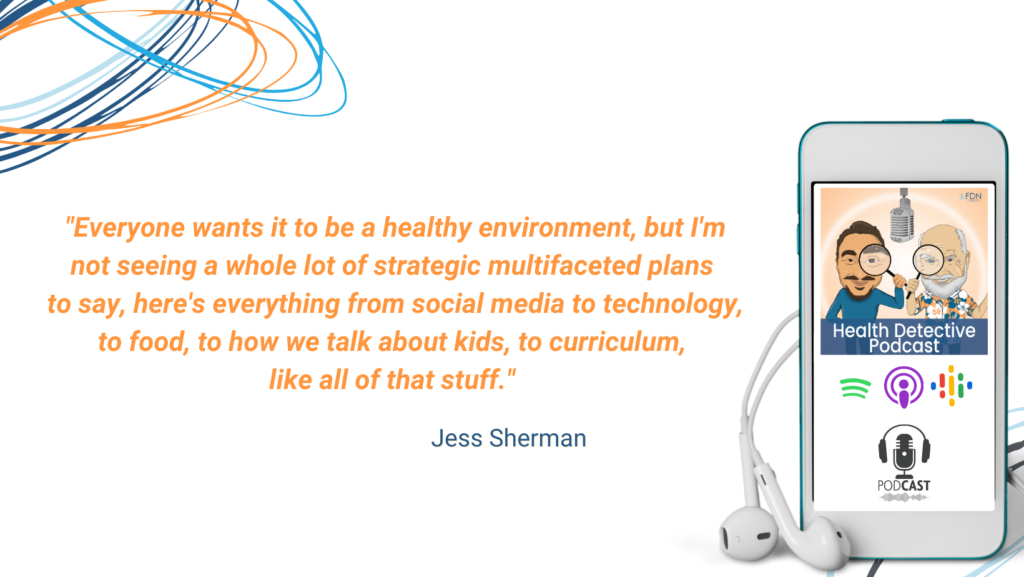
I think that’s what everyone wants. Everyone wants health for kids. Everyone wants it to be a healthy environment, but I’m not seeing a whole lot of strategic multifaceted plans to say, here’s everything from social media to technology, to food, to how we talk about kids, to curriculum, like all of that stuff. It’s huge. I mean, we’re going big picture here.
Five Things Anxious Kids Need
The way I do it in my little ecosystem, my little roadmap that I have for families is, I say, listen, we’re going to learn about your child’s body first and foremost, so that we can figure out what the leverage points are that we can help them feel better.

There are five things that every child needs, regardless of whatever we find out in the lab testing. They need real food. They need clean air and clean water. They need restorative sleep. They need movement and play; they need connection and a sense of purpose. So, we work on those things.
We help the parents talk to their kids about which of those do you find interesting, like where can we work there so that they can learn to take care of themselves? Then we figure out all of the H.I.D.D.E.N. stressors and all that stuff through the lab testing.
I would love to see more of that kind of stuff be integrated into school curriculum to be like, hey, what’s your health plan for this year, or this week or this month, depending on the age level of a kid?
[00:32:38] Detective Ev: I appreciate you humoring my big picture questions by the way. I’m always just trying to see it cause I know it can happen, but it’s going to take a little bit. So, any little piece of advice I can get I’ll take cause I hate leaving these teachers with nothing when they ask me, what can we do in the schools?
All Categories of Anxious Kids Need to be Realized
Obviously, let’s start with the healthy habits, but sometimes you don’t even know where to start.
I think the other problem is here too, it’s not even like the schools are just blatantly neglecting these people and not telling them this stuff, it’s that they don’t know it either.
It’s the same issue with the doctors. It’s not like the doctor that was recommending Xanax and Zoloft to me was hiding the real secret behind their desk. They didn’t know either. I’m not saying this in a judgmental way, I’m just saying in a health way, they didn’t look particularly healthy. They were very overweight, very pale. They looked exhausted. They got the bags under their eyes.
I mean, this was not someone that was lying to me and using something in the back. I think that’s the problem. They say the first step in fixing a problem is identifying that there is one and recognizing that there is one. I don’t even know that that’s the obvious recognized problem when we see the behavioral issues in kids nowadays.
A lot of it’s been blamed to COVID. I’m in the schools, I definitely saw the increase due to COVID, but there was a lot going on before guys. I’m like, there’s a ton of stuff happening that had nothing to do with COVID.
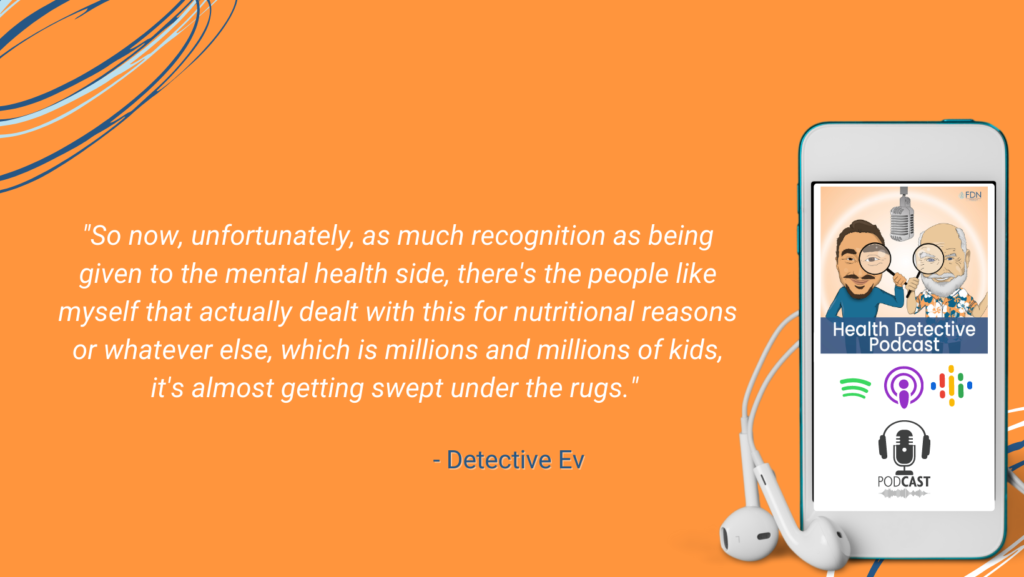
So now, unfortunately, as much recognition as being given to the mental health side, there’s the people like myself that actually dealt with this for nutritional reasons or whatever else, which is millions and millions of kids, it’s almost getting swept under the rugs. We think, oh, well, it’s COVID and it’s this time. It’s like, well, no, it doesn’t really have to be this way.
Promising Effects of Gluten-free for Anxious Kids
I think that’s powerful that you mentioned focusing on those five things first. Like, are they getting good sleep? Are they getting clean air and clean water? I’m sure you’ve seen this since you actually work pretty much exclusively with them, kids respond so quickly to when they get the right things.
I mean, adults can respond pretty fast. A kid, it could be a two-day transformation sometimes. They’re not in perfect health, I don’t want to speak ignorantly here, and someone get me wrong that’s listening. But you’d be surprised how fast a kid can change when they are actually given the things that, shockingly, a kid was meant to have.
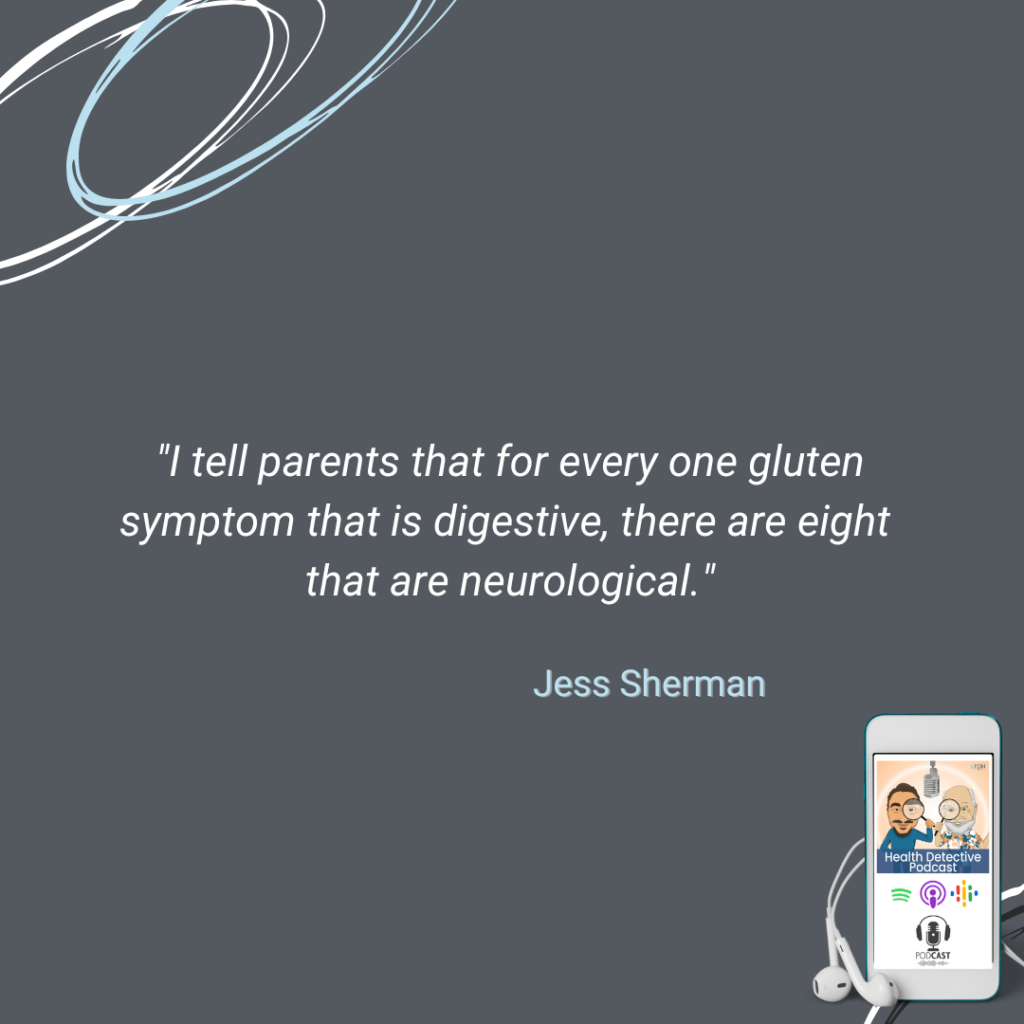
[00:34:34] Jess Sherman: To bring it down to something really practical, I think the thing with teachers and parents is they want management tools. I tell parents that for every one gluten symptom that is digestive, there are eight that are neurological.
The number one tissue in the body that gluten likes to attack is the brain tissue. That’s like, oh, okay, we’re going to give this a shot. I have literally had people go off gluten, like take their kid off gluten for a while, and teachers think that they’re on medication cause there’s that much of a profound shift.
It doesn’t happen all the time, that’s not always the thing. There’s very rarely one answer to what’s going on. But not a lot of people know that. Even specialists who understand celiac disease don’t understand the extent to which it can affect the brain and the nervous system.
Anxious Kids: Normalizing Food’s Effect on Mental Health
So, I just think it’s about getting this out there. The more people who have success with this, when parents go through my program and they have their kid on the other side, they’re telling everybody. They’re like, oh my gosh, everyone needs to know this.
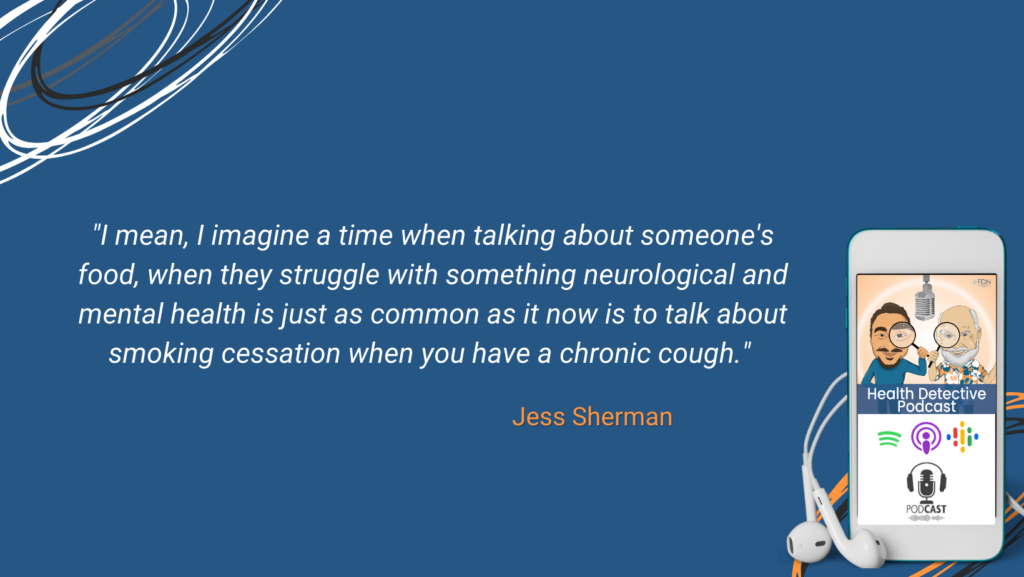
Yeah, it’s a rocky road to try to figure it out, trying this and trying that. But when you come out the other end of it, the more people who have success with it, the more it’s going to become mainstream. I mean, I imagine a time when talking about someone’s food, when they struggle with something neurological and mental health is just as common as it now is to talk about smoking cessation when you have a chronic cough.
These things take time to become normalized, but that’s the work you and I are doing is to get it more out there so that it becomes normalized.
[00:36:07] Detective Ev: Bingo. That’s why I love the privilege to get to do this. I love the saying, facts tell, stories sell. It’s not that we’re selling anything in particular, but we’re selling an idea, a way of living, a concept.
I could give people all the facts. I actually thought that was fascinating about for every one digestive symptom, there’s eight neurological ones. I did not know that. But some people don’t really resonate with that as much.
When you hear how a life is transformed, that’s something that sticks with people 20, 30 years later sometimes. That leads me to my next question here. As someone who’s been doing this for so long, I can only imagine the stories that you have.
Success Stories of Anxious Kids
If you want to do even two or three, that’s fine, but one’s also okay. It’s up to you. I’m just curious, are there any client testimonials that really stick out? Maybe a totally troubled kid, and then you were able to come in and do this work and just kind of transform things for the family? I’m very curious about that.
[00:36:54] Jess Sherman: Well, it’s always a mix. There’s information and there’s implementation. I’m just going to be straight up and honest and say, I have had people where we find out a lot about a kid, there’s all kinds of things going on. But we work for months and months and months to get the kid to buy in, to take the supplements, and to do the changes. There is that side of thing.
I’ve also had kids, particularly the very sensitive kids who just want to feel better. When there’s even just that little glimmer in them of, I just wish I didn’t fly off the handle all the time. I have one kid in particular I’m thinking of who was very volatile.
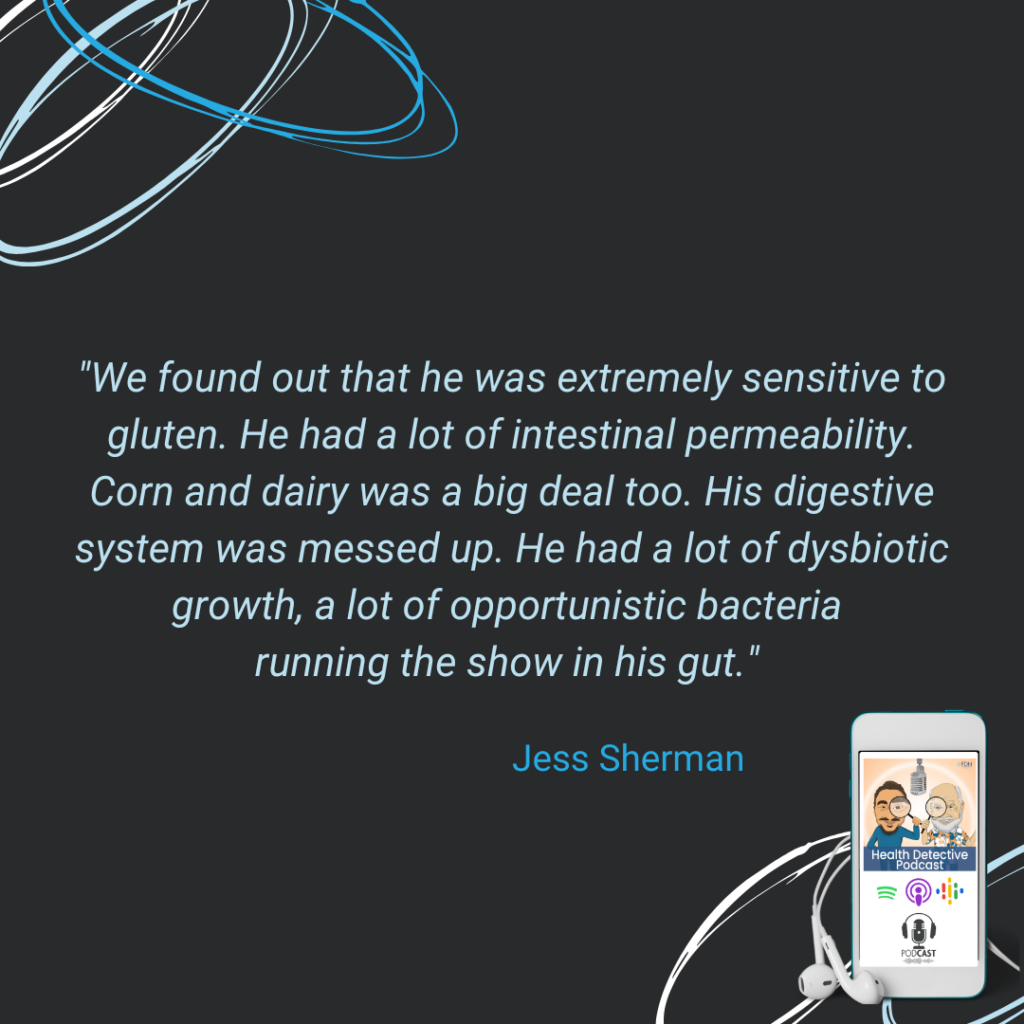
He would just lose it and get kind of aggressive. But then he would take himself away and come back and have this remorseful moment of, I just don’t want this anymore. We found out that he was extremely sensitive to gluten. He had a lot of intestinal permeability. Corn and dairy was a big deal too. His digestive system was messed up. He had a lot of dysbiotic growth, a lot of opportunistic bacteria running the show in his gut.
Seeing the Lab Results & Following the Protocol
He had really high pyrroles as well, which is something that I’ve started testing for. These are compounds that come out in the urine, and they leach zinc and B6. So, when you have chronic deficiency of zinc and B6, it’s really hard to create your neurotransmitters, those calming neurochemicals. He had that as well. There was like a perfect storm.
For him, like he was a teenager so what we did was I video reviewed the labs with him in mind because I don’t want any kid to feel like they’re broken or there’s something wrong with them. That’s not what these tests are telling us. They’re just windows into the body and they’re helping us identify the opportunities we can leverage to help them feel better.
So, I did that, and he saw it. He was just wide-eyed. He was like, wow! Then he was on board. He literally said if this can help me be a more productive member of the family, it was something along those lines.
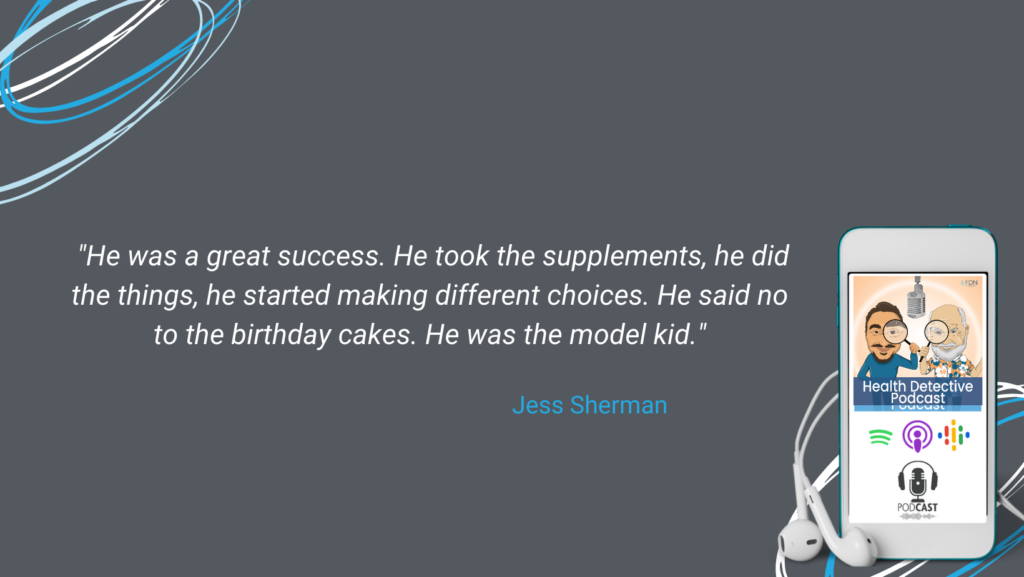
This kid was incredible. He just wanted to do right but he was out of control. He didn’t have control over himself. He was a great success. He took the supplements, he did the things, he started making different choices. He said no to the birthday cakes. He was the model kid.
Now, like I say, it’s not all this cut and dry. But those are the biggest rewards when the kids have an interest, and we always have that conversation, like how interested in this are you? If they are interested even the littlest bit, then we bring them into the process. We explain what’s going on in their body and how it relates to how they’re feeling and thinking. Often that will help buy them in.
Take the Whole Person & Health Concerns into Consideration
[00:39:20] Detective Ev: That’s so cool that he was that interested in it. You know, I’m not particularly surprised.
The reason I don’t talk about the functional stuff always with the kids is because it doesn’t relate to everyone in that audience. I can speak to things that relate to everyone in that audience, typically. But with the things I do recommend, like my little steps at the end that are generic but useful nonetheless, kids want to learn, man. They’re sponges almost.
Sometimes as adults, at least I found in my life, they project their rigidness onto the kids and act like they’re not going to want to do that. It’s like, no, Mr. and Mrs. So-and-so, you don’t want to do that. Kids are learning all the time. They’re changing every single day and every single week. I find that they’re some of the most receptive human beings to change with this.
You know, especially with the thing of feeling out of control and ending up in trouble for this, it really brings me back to when I was in middle school and high school. I was getting in trouble for fights. I ended up in a juvenile detention facility. I don’t want to sit here and excuse my actions. I’m not even advocating this for me per se.
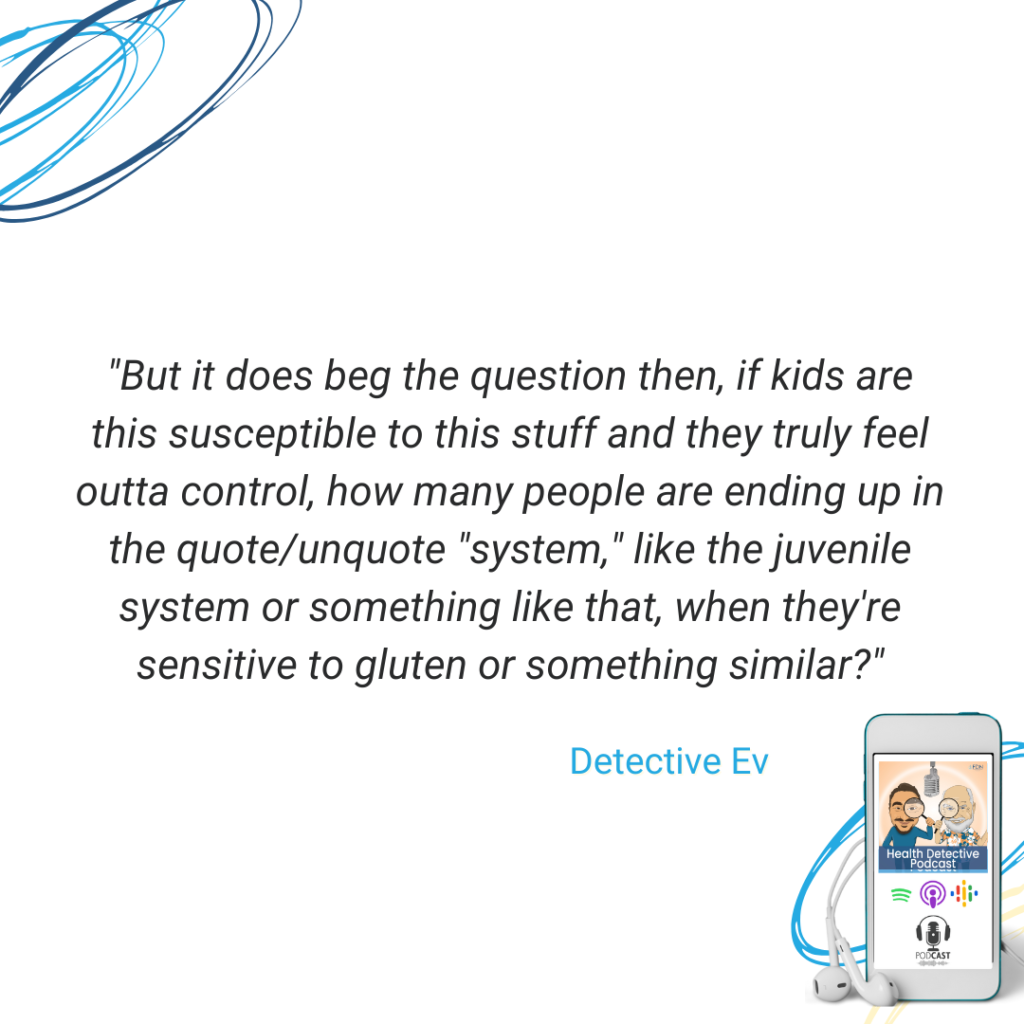
But it does beg the question then, if kids are this susceptible to this stuff and they truly feel outta control, how many people are ending up in the quote/unquote “system,” like the juvenile system or something like that, when they’re sensitive to gluten or something similar? Because the adults act like crap when they’re moody or whatever. Kids, they might actually do something that really has some serious consequences for them.
Anxious Kids & Their Stress Cups
I feel like we need to get people thinking about that kind of thing. There’s kids’ lives that are going to be impacted for the rest of their time here because of something that maybe wasn’t even entirely their fault to begin with. I find it hard to believe that I had no role in the things that I did when I was younger. But at a certain point, a six-year old’s pretty hard to blame for most of their actions, in my opinion, especially if they’re sick and neuro inflamed and feeling like crap all the time. That’s a pretty tough way to operate in your life.
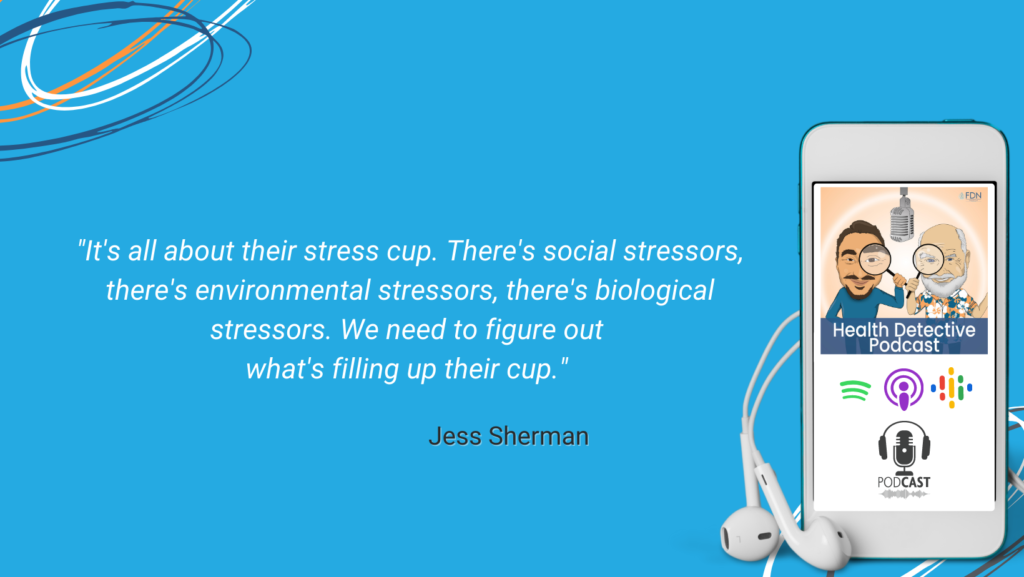
[00:41:07] Jess Sherman: I break it apart to be like, there’s their stress cup, right? It’s all about their stress cup. There’s social stressors, there’s environmental stressors, there’s biological stressors. We need to figure out what’s filling up their cup. It’ll be a different weight for each kid.
But we also have to look at their genetic capacity to tolerate stress because that’s a thing. We know epigenetics and we don’t have to get into epigenetics and genetics. But some people, when they are under stress, they are more likely to show symptoms of depression, or symptoms of anxiety, or symptoms of impulsivity because of their genetics.
Then we have to say, okay, so what are your biggest stress triggers? What’s filling your cup and where are our leverage points there? All of those things need to be taken into account.
[00:41:49] Detective Ev: Well, Jess, I think this is a really good opportunity I hope for you and the things that you’re doing. Obviously, you’ve been doing it for a while anyway.
Where to Find Jess Sherman
But I know that many of the people that listen, they’re typically coming on for a personal health story. Believe it or not, it’s actually really not that common that we get someone on that is really focusing on the kids. So, if people are interested in working with you, where can they find you?
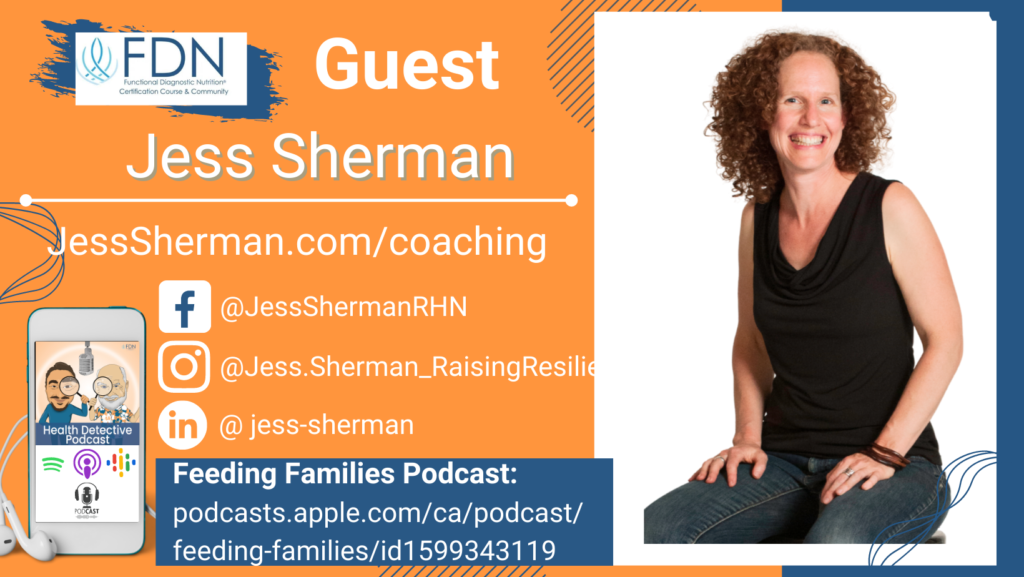
[00:42:11] Jess Sherman: Yeah, everything’s at my website, which is my name. So, JessSherman.com. There’s three S’s in a row, sometimes that trips people up. And the program that I bring people through is called The Resilience Roadmap. It’s literally a roadmap to stronger stress response, stronger resilience. So that’s JessSherman.com/resilienceroadmap.
Everything’s on my website. I have a podcast called The Feeding Families Podcast. I have a book called Raising Resilience. But everything can be found from the hub of my website.
[00:42:38] Detective Ev: Excellent. Of course, we’ll have this in the show notes for people, but it’s always good to just hear it verbally.
I can’t believe 50 minutes completely flew by here today. I want to finish by asking you the signature question on the Health Detective Podcast. I guess this is one that’s kind of tough, cause we’re focusing on families today and focusing on parents.
Whether it’s a message to parents, kids, or whatever, you can take this however you’d like. The question normally is in this case, if I could give you, Jess, a magic wand and you could wave it and get every single person in this world to do one thing for their health (so maybe that’s like every single parent or every single kid, it’s up to you), what’s the one thing that Jess would get them to do?
The Health Detective Podcast Signature Question
[00:43:11] Jess Sherman: Oh, there’s so many. I should have done my homework, so I’d know what the question was.

I’ll tell you one thing I would wave my magic wand to erase mom-guilt. Like just erase it from the face of the planet so it does not exist, cause guilt does not serve us. We all think of what we should have done, what we could have done, what we didn’t do, what I wish I had done, and what I wish I had known. So, that would be gone.
Then I think if I can do two, can I do two? If I could do two, one would be to just think, have a good solid conversation with your parenting partner about health and about your vision of health. What does a healthy family look like to you, feel like to you?
What does a healthy child look like and feel like to you? And how close, or how far away from that are you right now? I tell people that I help people course correct. I just course correct. But you have to first identify that there’s something to course correct. We get so busy in our lives and we’re just on a treadmill as parents.
So, just having a stop for a sec, take a breath, and think about what the vision of health you have, what is it that you want for your kids and for your family? From there, if you have that vision, that’s the starting point. You don’t know how to get there because otherwise you would be there by now.
We Need to Give Anxious Kids More Credit
Don’t worry about that, just think about what it is that you want. Then find people who can help. It might not be me but find people who have a plan in place for how you can get closer to that vision of health.
I could do so many more, Evan. There are so many things, but I’ll leave it at that.
[00:44:43] Detective Ev: All right, guys, that’ll do it for today’s episode with Jess Sherman. I hope you liked this one. I think this is well overdue. It’s one that we need in today’s world. Listen, she admitted it herself. It’s tough working with families. You’re trying to get someone else healthy, which is already tough enough to get them on board to do this. And you’re trying to do it through someone else.
Then on top of that, they are a kid. But as you heard from Jess’s client testimonials, I think there’s something to be said about this idea that kids, we gotta give them a little more credit. When they have a problem, and they know there’s a problem (there’s something that they don’t like), and they are presented something that actually makes sense, I find that they’re really open to it.
I think it’s sometimes adults, like we’re projecting onto the kids because we are more solidified in our ways, and we’ve become more closed minded. We think, oh, well they won’t think this way.
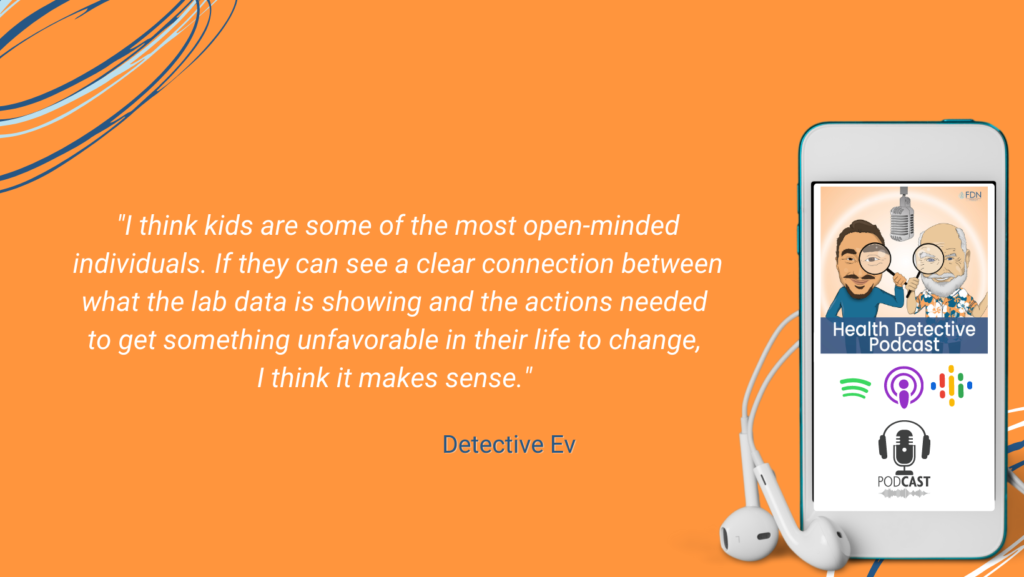
I think kids are some of the most open-minded individuals. If they can see a clear connection between what the lab data is showing and the actions needed to get something unfavorable in their life to change, I think it makes sense. We need to give them a little more credit.
Conclusion
Hopefully, if you are out there and your kid is suffering or someone else’s kid is suffering, maybe you send this podcast along to them. Or if you’re an FDN listening, you go and try to give them some help. We need more people working with kids. I feel a little hypocritical because I don’t do it myself as an FDN cause I know how tough it is. But you know, I do my work in the school. So, I try to do my part.

I think if we all did our part in our own ways, whether it’s FDN or something completely different, that would really help change the world and get it back on track. Because how this next generation turns out is really going to have some major implications on what our world will look like 10, 15, 20 years from now.
I hope you guys enjoyed today’s episode. If you like the information that we’re sharing, please consider leaving us a five-star review on Apple and/or Spotify. If you would do that, we would love you even more than we already do.
I’m looking forward to talking to you guys again soon. But until next time, take care.
You can always visit us at functionaldiagnosticnutrition.com.
To hire a coach, go to fdnthrive.com.
For a free Health Review, go to fdnthrive.com/match/.

